45 Bizarre Animal Behaviors During a Total Solar Eclipse
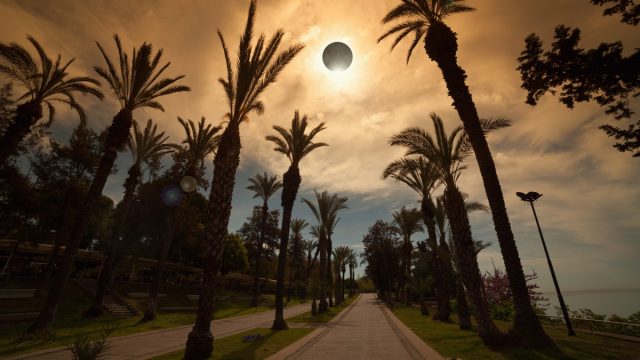
By now, you’ve probably heard ample chatter about the April 8, 2024 solar eclipse. What makes this one special is that a total solar eclipse that can be seen by this much of the United States is quite rare. According to NASA, your next opportunity to see this celestial event from the contiguous U.S. won’t be until Aug. 23, 2044. That’s right—unless you plan on doing some eclipse chasing, this is your last chance for 20 years.
Don’t worry, though, because the show on April 8, during which the Moon will move between the Sun and the Earth and completely block out the Sun for several minutes, will be a big one. USA Today notes that the upcoming event will have a much wider path of totality (meaning more Americans will be able to see it from their homes) than the most recent total eclipse in 2017, and the next total eclipse in 2044.
There will be Earth dwellers watching… including animals. In fact, it’s been well-documented that many animals—whether out in the wild or a pet at home—notice when a solar eclipse is happening, and as a result, exhibit some pretty peculiar behavior. Here are 45 science-backed facts about how animals may react to the upcoming total solar eclipse based on past events and how you can help scientists record these bizarre animal behaviors for future research.
RELATED: 25 Solar Eclipse Facts That Will Blow Your Mind.
Why do animals react to a solar eclipse?

According to NASA, a solar eclipse is a term for any time the Sun, Moon, and Earth line up, whether fully or partially. What makes the upcoming total solar eclipse notable is that the Moon will completely block the Sun for those in the path of totality.
“People located in the center of the Moon’s shadow when it hits Earth will experience a total eclipse,” NASA says. “The sky will darken, as if it were dawn or dusk. Weather permitting, people in the path of a total solar eclipse can see the Sun’s corona, the outer atmosphere, which is otherwise usually obscured by the bright face of the Sun.”
Wild animals and pets at home will likely notice the astronomical event due to changes in light and sound. Over the years, scientists, researchers, and average people alike have witnessed unusual animal behaviors during past total solar eclipses, such as animals getting sleepy, more alert, frisky, and even noisy.
You can help researchers record these odd animal behaviors.
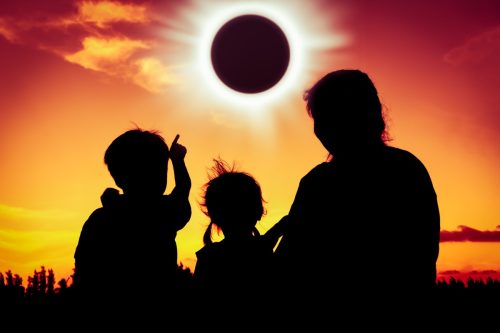
There’s still a lot the science community doesn’t know about how these rare events affect our furry friends. That’s why the same researchers who have documented many of these odd animal behaviors during solar eclipses are now asking for your help to make your own observations in a few days, reports CNN.
Scientists are encouraging people across the U.S. to take note of their pets’ behavior during April’s total solar eclipse through a program called Solar Eclipse Safari.
“We want to know how species that haven’t been observed before behave during an eclipse,” the program states. “These include other types of zoo animals (whichever you think might do something interesting), and it also includes animals in the wild, like squirrels or deer, or domesticated animals, like your pet cats and dogs (if they are outside during the eclipse!) and cows, or goats on a farm.”
If you don’t have pets to observe, head to the zoo.
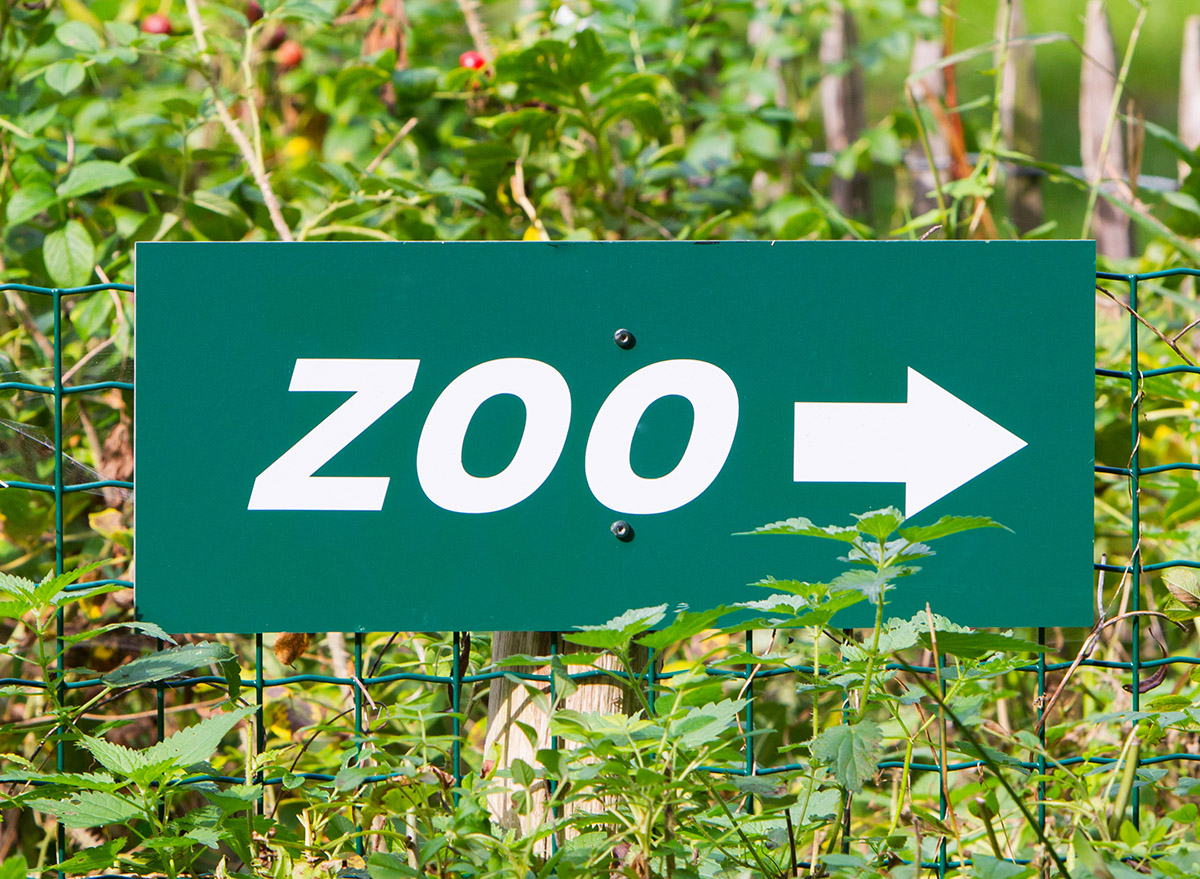
Researchers are also inviting members of the public to the Fort Worth Zoo in Texas—which is in the path of totality—to help document animal behaviors during the big event.
“Animals may begin pacing, look towards the sky, or make noises that they usually don’t make,” the Solar Eclipse Safari project states. “Birds and insects may make more noise before the eclipse and less noise at the totality of the eclipse. By studying animal behavior during an eclipse, we can not only learn more about whether different animals of the same species respond similarly, but we can also more broadly learn more about how animals respond to new and unique experiences.”
Not able to make it to Texas but still curious to learn how various species react when the Sun (temporarily) disappears? Read on for the 45 strangest animal behaviors that have previously been reported during a total solar eclipse.
45 Strange Animal Behaviors During a Total Solar Eclipse
1
Bees no longer feel the buzz and take a pause.
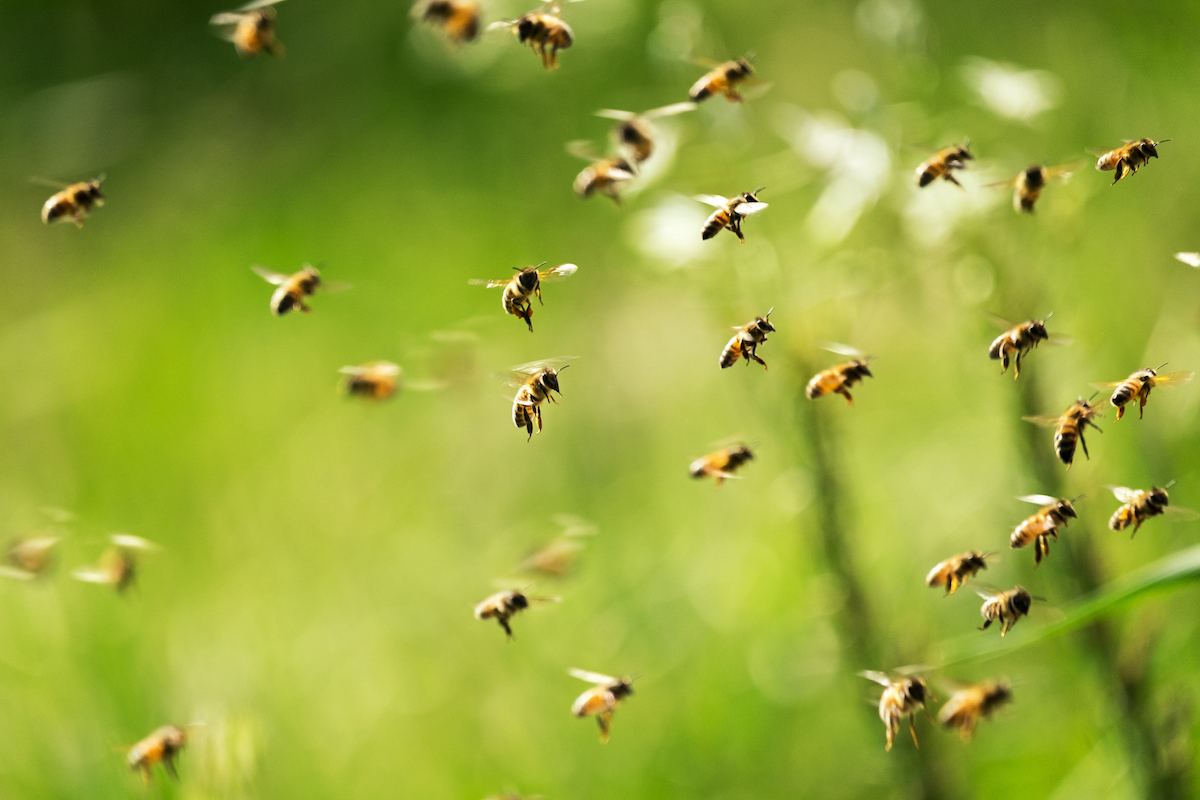
Bees are typically abuzz with activity, but the eclipse’s effect on them is arguably one of the most alarming. According to a 2019 study published in the Annals of the Entomological Society of America, the bee’s reaction to the eclipse is almost instant, as they cease all activity.
Lead researcher Candace Galen, PhD, reported, “We had not expected that the change would be so abrupt, that bees would continue flying up until totality and only then stop completely. It was like ‘lights out’ at summer camp! That surprised us.”
2
Owls start hooting and hollering.
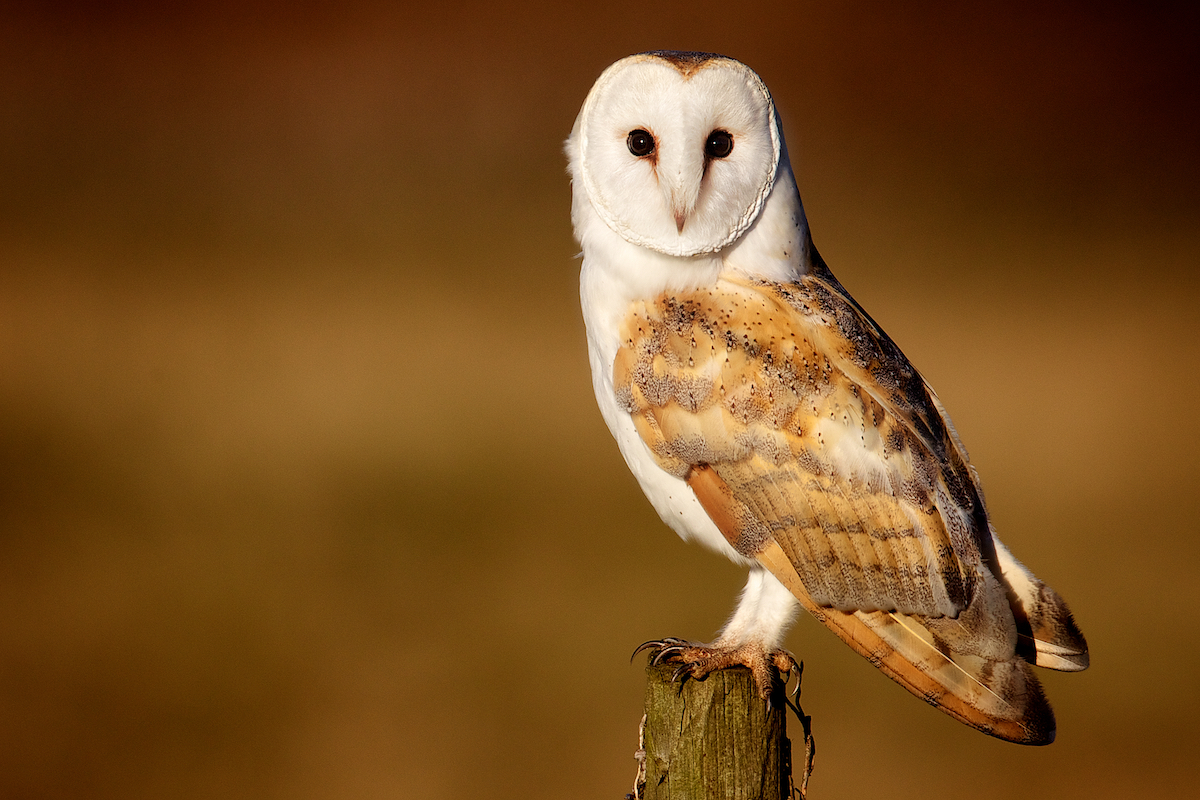
While owls haven’t been studied to the extent of bees, the National Audubon Society says that these nocturnal birds of prey have been reported to start hooting during a total eclipse—which makes sense, since it briefly looks like nighttime outside.
RELATED: 81 Weird Animal Facts Everyone Should Know.
3
Flamingos unite to guard their babies.
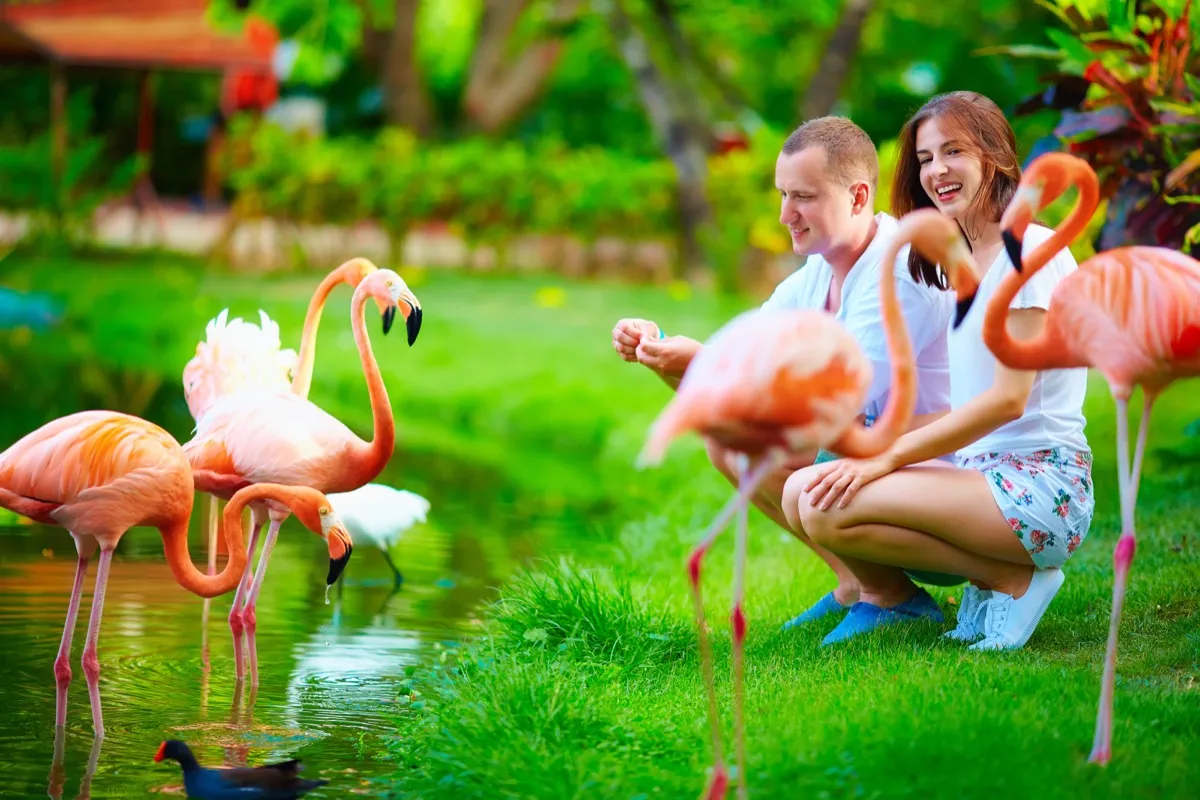
When flamingoes experience a solar eclipse, their attention turns toward their babies. They typically leave the water and huddle around their young, the Associated Press reports.
Flamingoes also tend to exhibit signs of anxiety and walk around nervously.
4
Pelicans pack it up and head home.
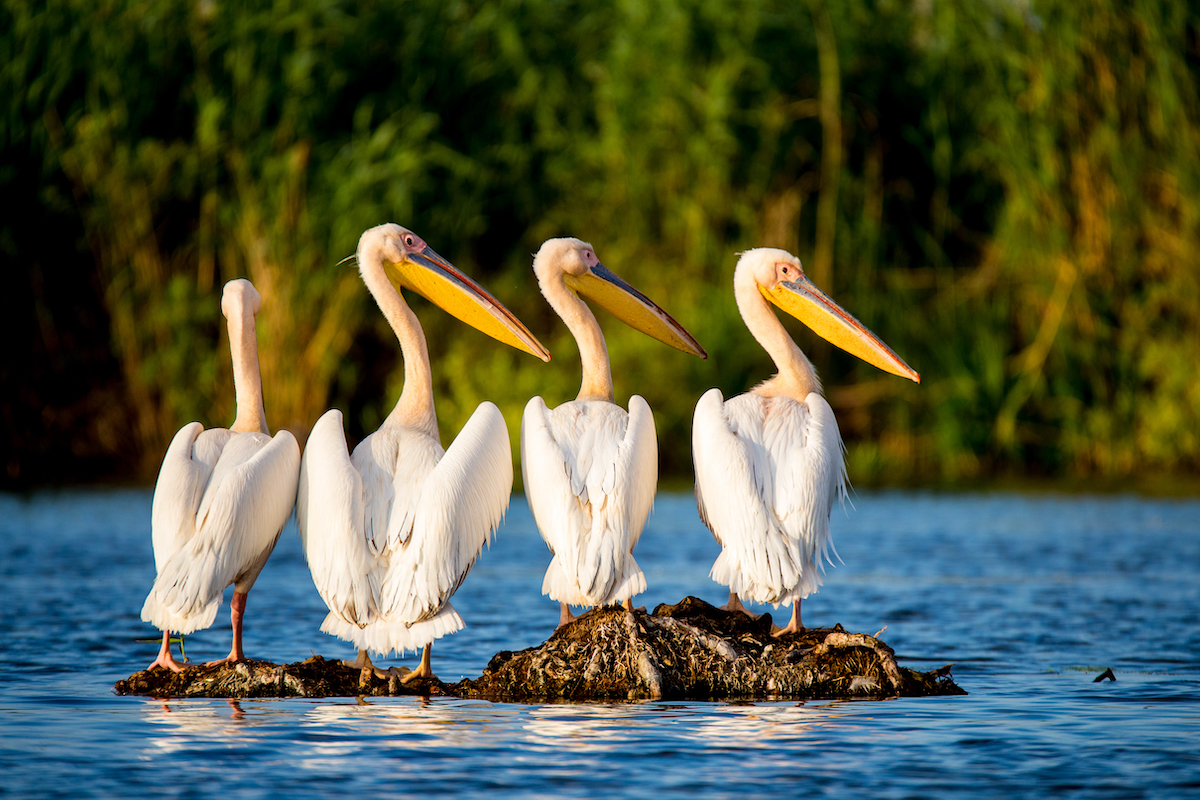
Pelicans are just as impacted by the eclipse as flamingos. However, instead of becoming restless, they retire to their roosts. The sudden darkness interrupts their daytime routine and makes them feel like it’s night.
In a 2020 study published in Animals, Adam Hartstone-Rose, PhD, a North Carolina State University professor, found that pelicans returned to their bay after the event, and continued their daily activities.
5
Pigeons think it’s sleepy time.
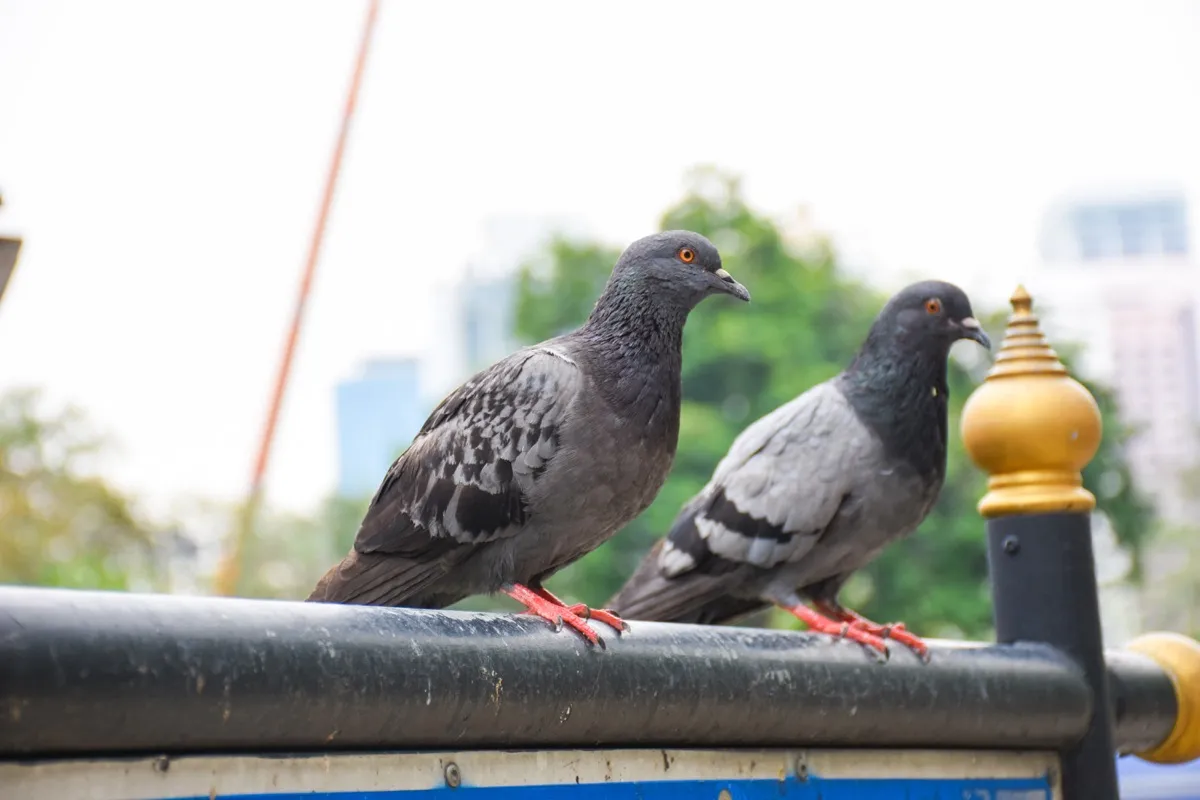
Much like their avian peers, pigeons are confused by the darkness the totality creates, the National Audubon Society says. So, when the Moon covers the light from the Sun, pigeons head back to their roosts for bedtime.
6
Ducks might look up at the sun.
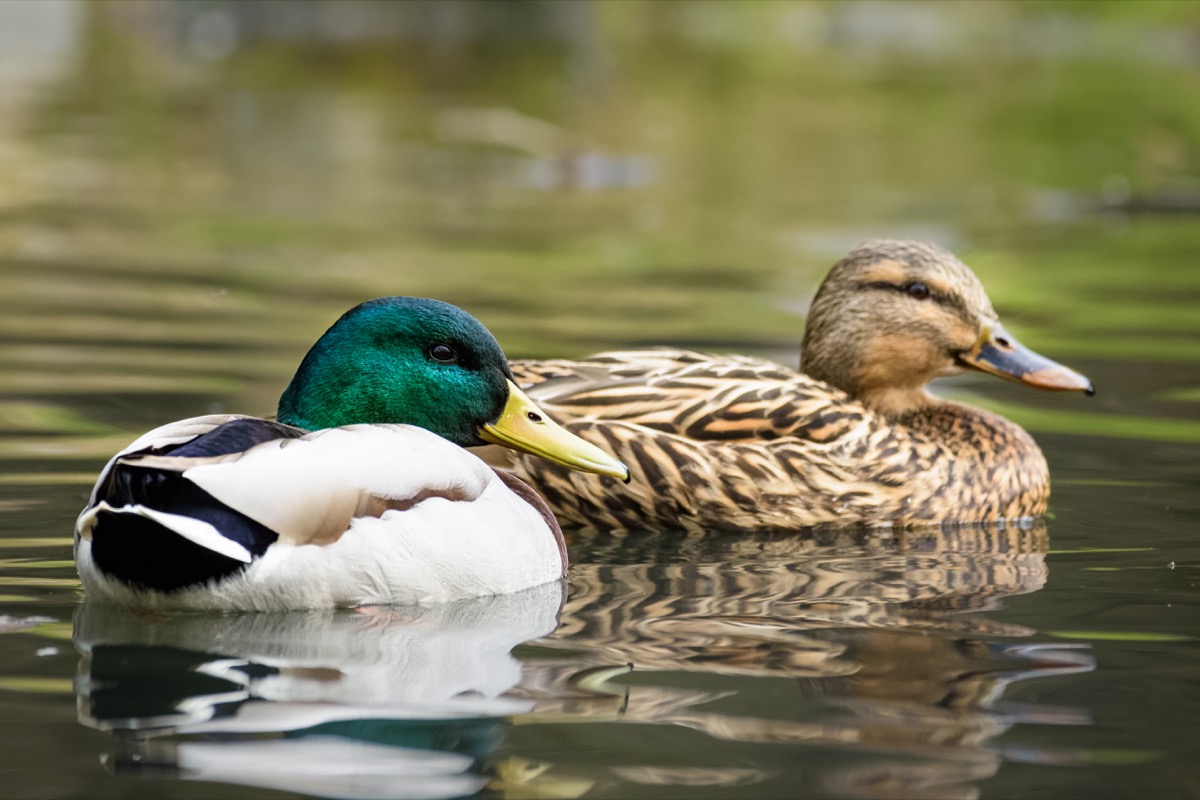
Ducks might not be the smartest creatures, so there is some chance they’ll look right up at the Sun and injure themselves, the blog Fresh Eggs Daily cautions.
Ducks “turn an eye to the sky anytime they spot anything flying overhead, and there’s no telling how the wild birds will react (I’ve read the darkness might even draw out bats), which could cause our ducks to turn to look upwards, so I think it’s not a bad idea to keep your ducks indoors during the eclipse,” the site says.
7
Cockatoos fall in love.
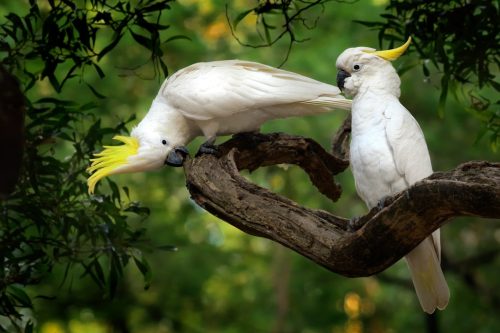
Some cosmic event brings creatures together, like cockatoos. During the eclipse, male cockatoos engage with female cockatoos by leaning into each other and grazing their beaks, according to the Animals study.
Cockatoos also preen each other and raise their crests, but after the event, the birds separate.
8
Lorikeets move nervously as a flock.
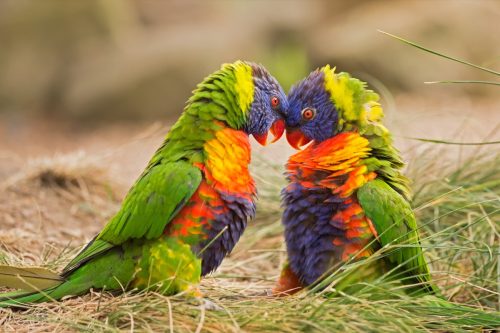
Lorikeets are known for becoming restless during totality, and at the peak of the eclipse, the flock becomes very active, as reported in the Animals study. They also fly and move together in a synchronized fashion, and as the eclipse ends, the birds grow quieter and begin to preen themselves.
9
The great blue turaco fans its tail feathers with fear.
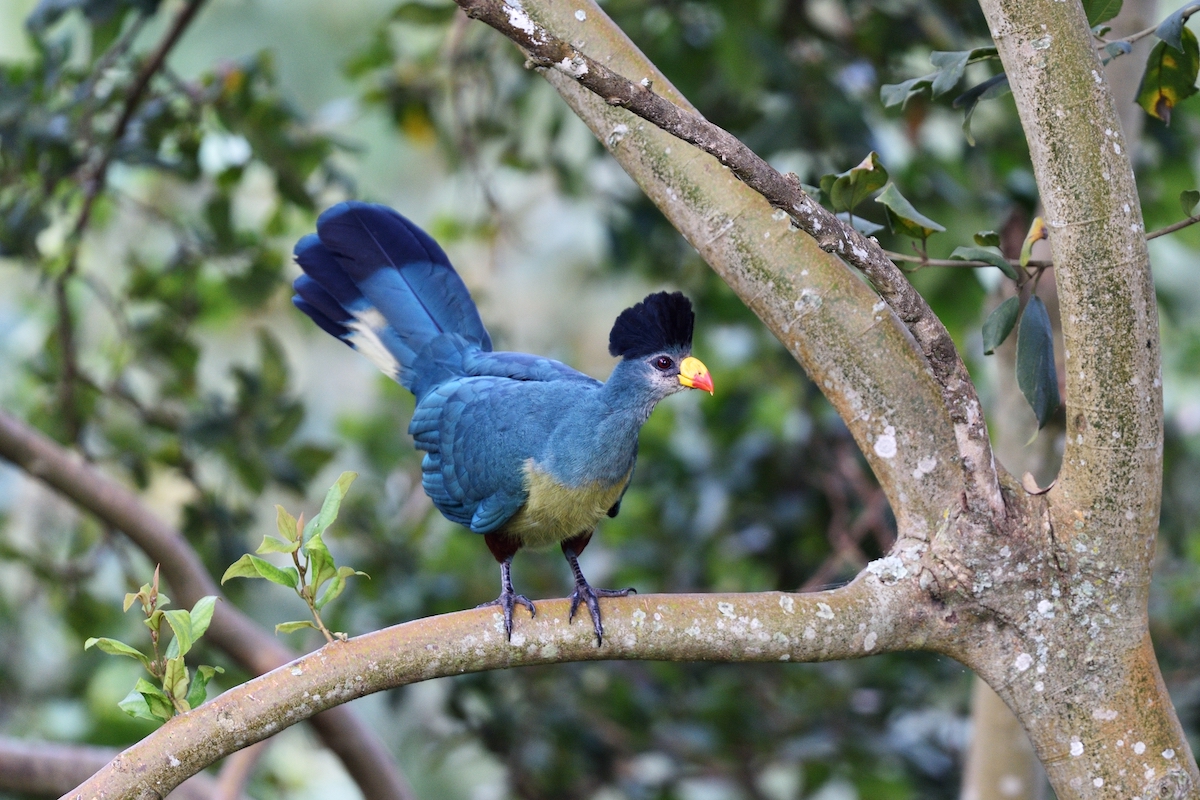
The great blue turaco is a strikingly grand bird that also bows to astronomical wonders. This bird was observed in the Nashville Zoo during an eclipse, during which time it became more vigilant and gazed at the sky.
The turaco became more nervous and flapped about wildly as the sky grew darker. Its feathers pointed out with anxiety, and its tail feathers fanned out. The bird remained anxious throughout the eclipse, but returned to normal once it was over.
10
Lapwings freak out.

This dapper bird doesn’t behave very elegantly when experiencing an eclipse. It panics by flapping its wings rapidly and making loud, shrill noises, per the study led by Hartstone-Rose.
11
Rhinoceros hornbills sing out.
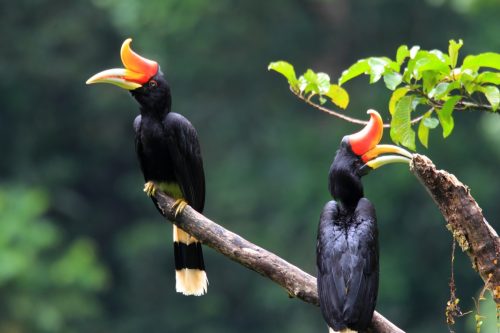
Rhinoceros hornbills are another bird species who likes to get loud during a total solar eclipse. Observers at the Nashville Zoo spotted these creatures moving to the top of their enclosure immediately after totality, and then vocalizing.
12
Dogs are big fans of solar phenomena.

This one is for dog lovers. Reports of dogs’ reactions to the eclipse are varied. While many pups may not have a significant response, some dogs have been reported to show signs of stress and anxiety, according to Erica Cartmill, PhD, a professor at Indiana University.
As she told People, dogs are known to pace around anxiously, howl at the dark sky, and, in some cases, get ready for bed during the total solar eclipse.
13
Cats can either be chill… or completely freaked out.

In true cat fashion (read: unbothered), your feline friend probably won’t even notice there’s an eclipse. However, M. Leanne Lilly, DVM, a veterinary behaviorist at Ohio State’s Veterinary Medical Center, explains to People that the shift in light, if noticed, could cause your fur baby to become anxious.
It’s common for them to engage in nervous habits, like hiding or clingy behavior.
RELATED: 29 Fun Cat Facts You Never Knew About Your Furry Friend.
14
Mosquitoes are attracted to eclipse totality.
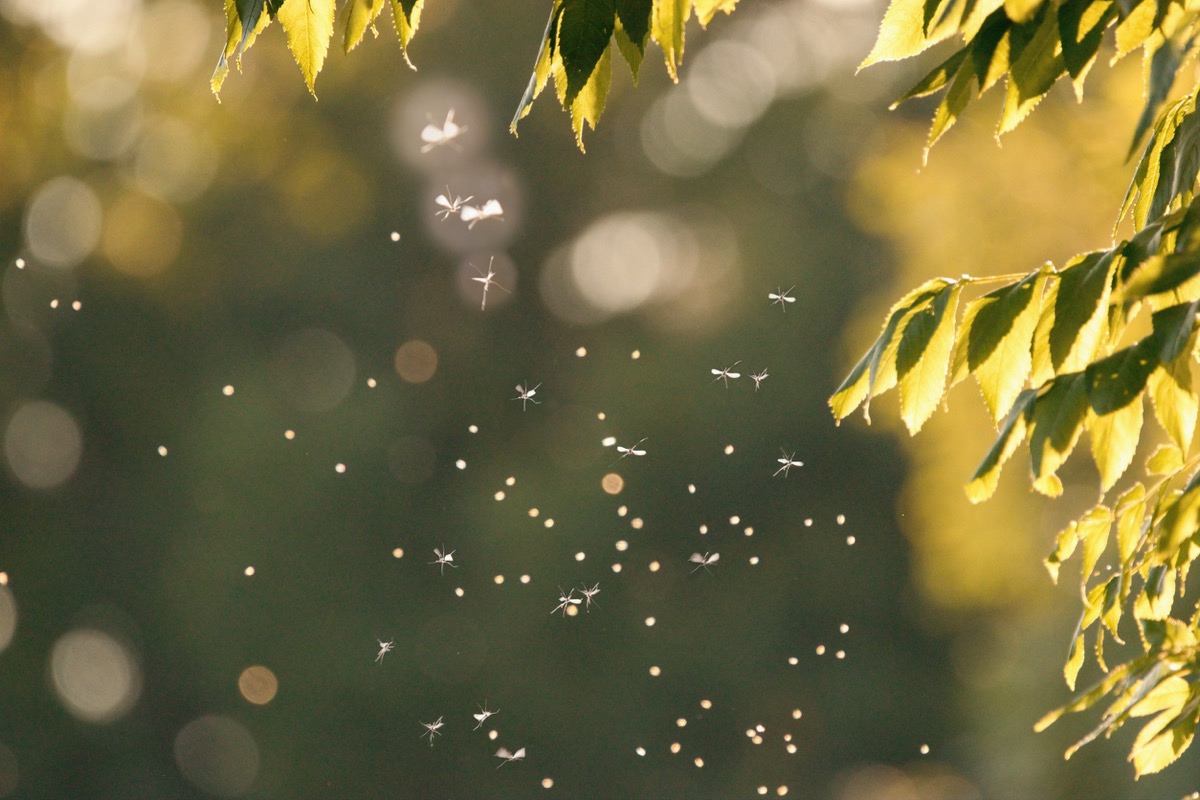
Be sure to break out the bug spray if you’re outside during a solar eclipse, because mosquitos will be joining you. According to Murdin’s 2001 report, “Mosquitoes and midges immediately appeared at totality.”
When mosquitos glimpse this fake dusk, they come out in full force, so you’ll want protect your skin.
15
Chickens get confused and come home to roost.
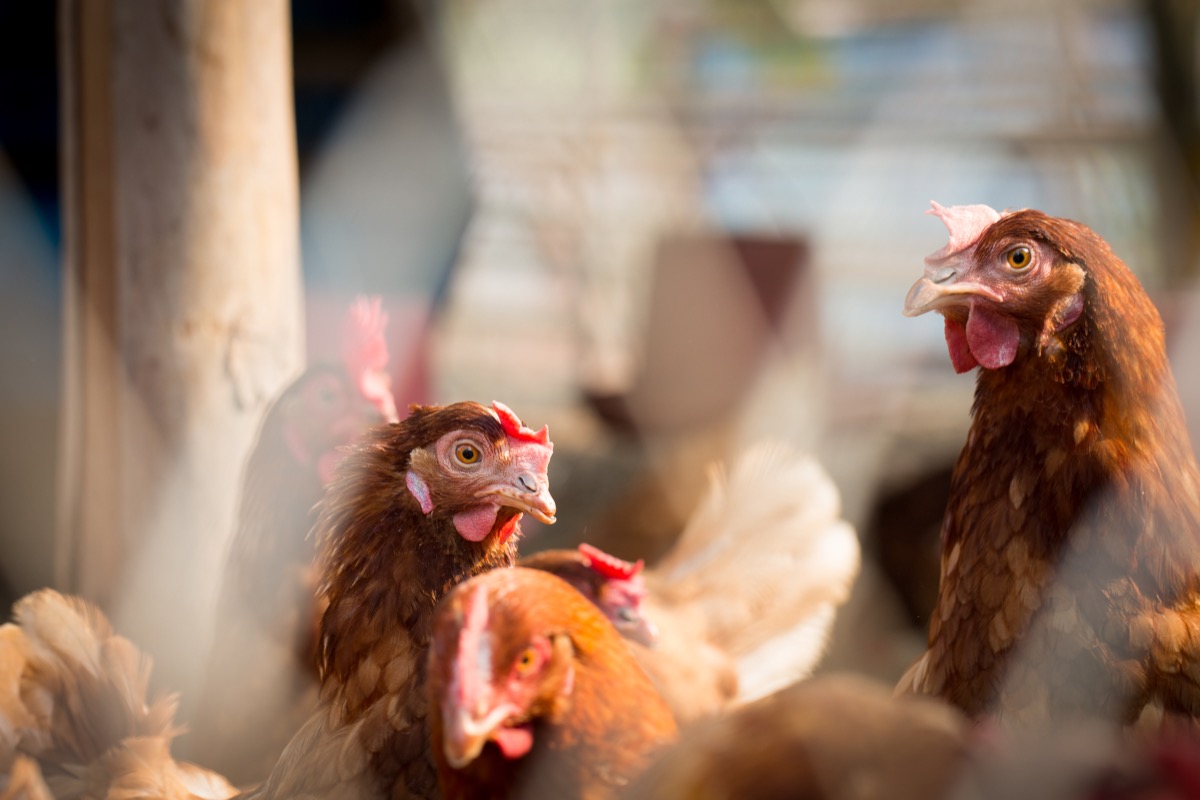
Like most animals, chickens are duped by the darkness the solar eclipse creates, and therefore return to their coops to roost. And as with other similar animals, when the Sun returns, they believe it’s morning again and resume their daytime behaviors.
16
Turkey vultures have similar reactions to pigeons and chickens.
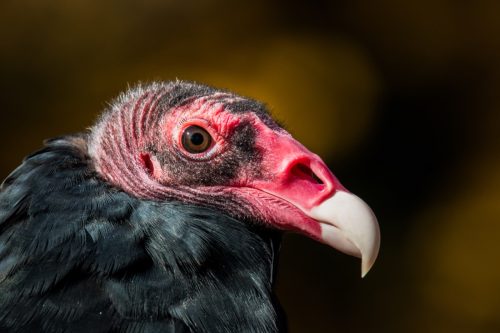
Turkey vultures also fall victim to the false night solar eclipses create, per BirdCast. Like pigeons and chickens, they retire to their roosts.
During totality, turkey vultures also interpret the darkness as a sign to stay close to the ground, because they rely on the Sun’s thermals to fly, according to the Hickory Knolls Discovery Center.
17
Sheep greet the coming darkness with a “baa.”
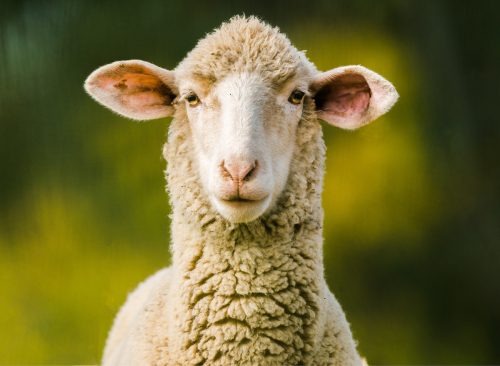
The Nashville Zoo’s sheep were mostly unbothered during the last eclipse, although too did “baa” as the eclipse slowly darkened the day and made it look as though night were approaching.
18
Goats are on high alert (and ready for bed).
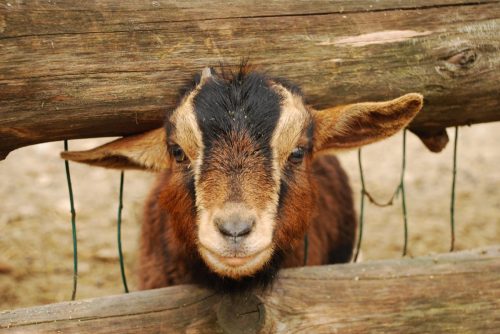
Also at the Nashville Zoo, a couple goats’ ears turned “to an alert state” during the eclipse. One goat was so fooled by the darkness of totality that it moved to the zoo’s after-hours area.
19
Cows get confused.
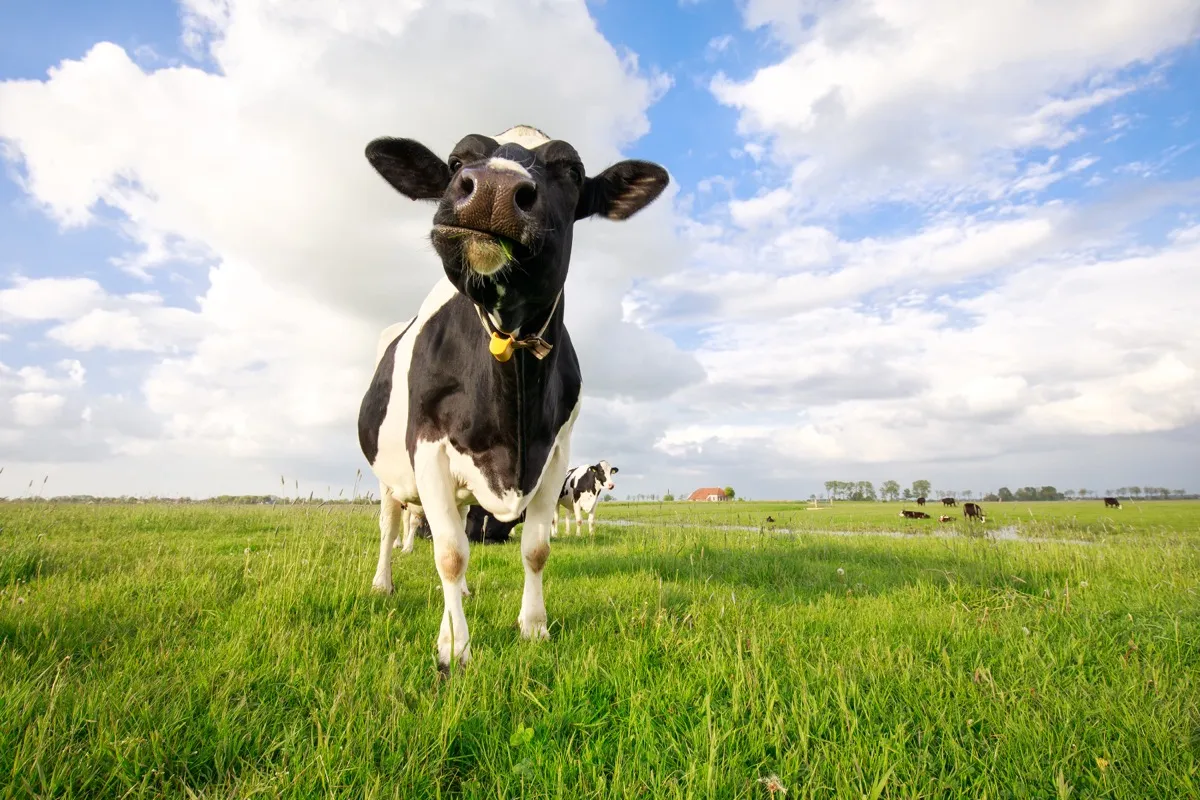
Much like chickens, cows get confused by the sudden darkness.
“If you happen to be on a farm that day, you may see, during totality, during that maximum darkness, you may see cows returning to the barns,” Holly Schreiber, PhD, Chief Scientist at the Buffalo Society of Natural Sciences, told WKBW.
20
Horses show a range of emotions.
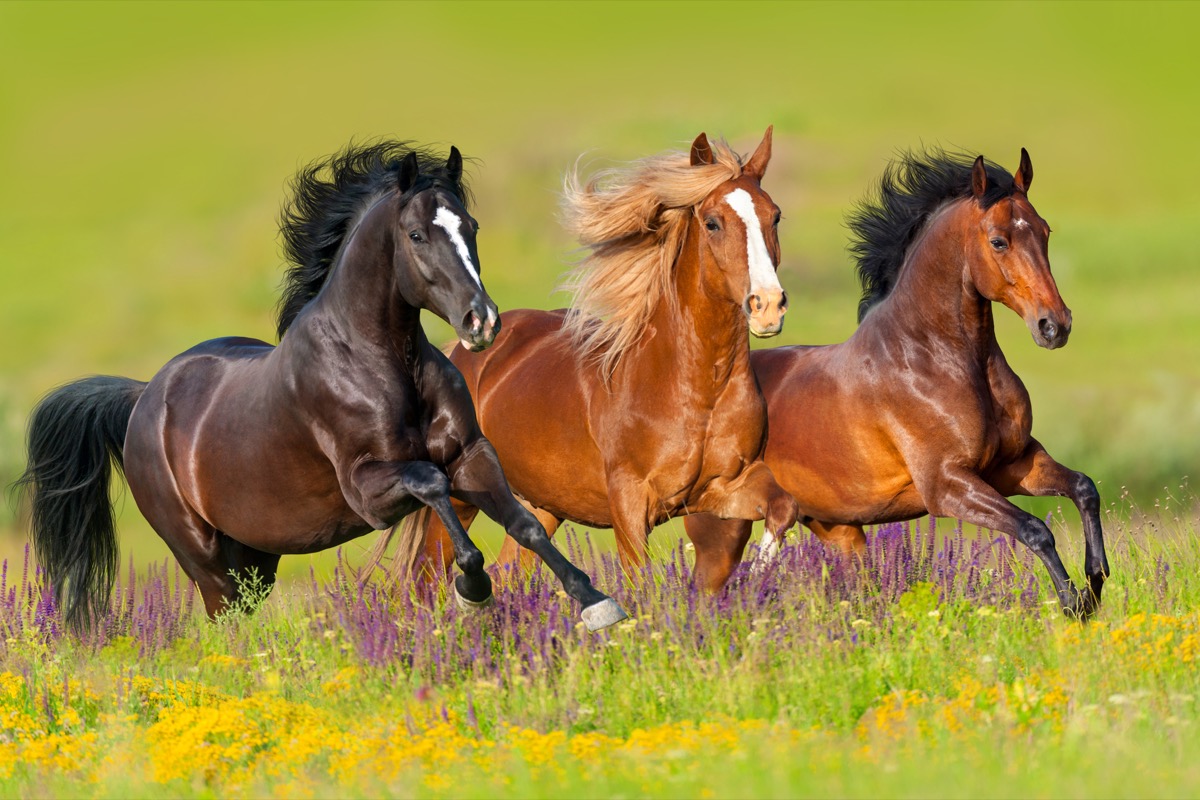
Horses are known to have varied responses to solar eclipses. Sometimes, they display nervous behavior, like shaking their heads and tails.
Research published in the Animals journal suggests they may huddle together, begin their bedtime routines, and head toward their stables.
21
Orb-weaver spiders grab a snack from their webs.
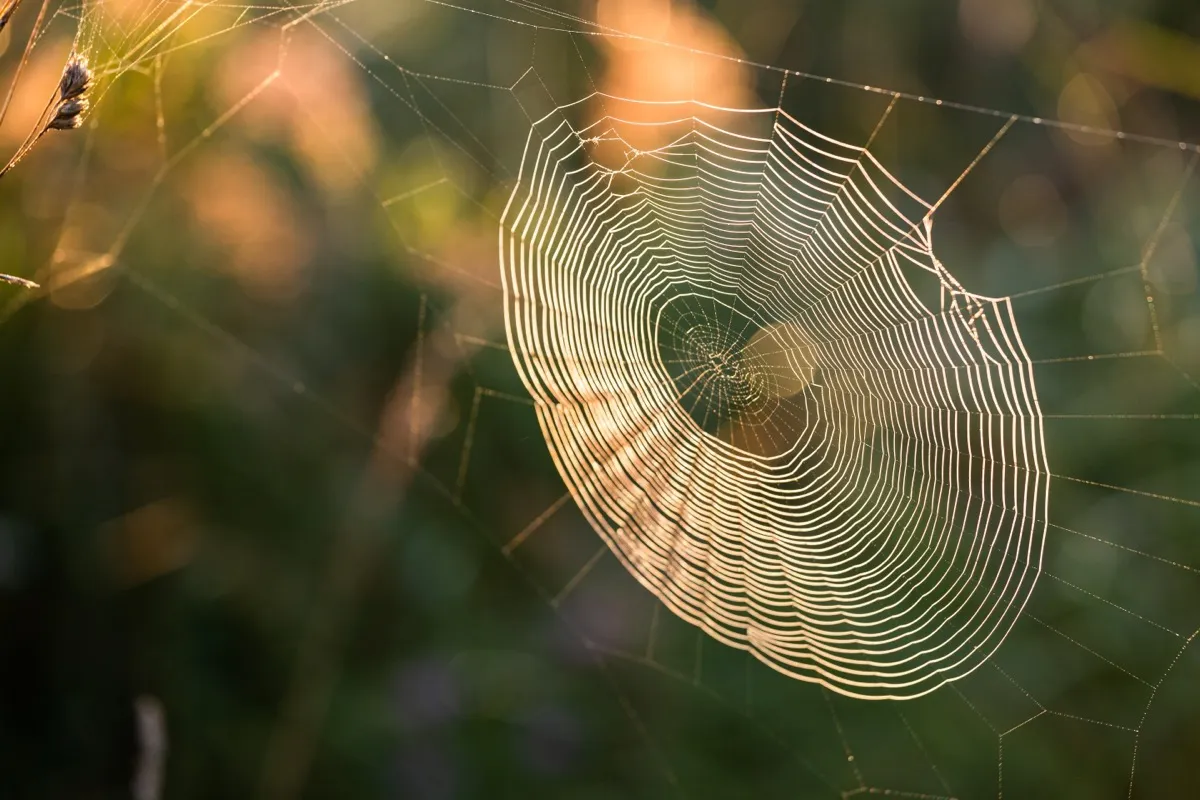
Orb-weaver spiders are interesting arachnids, because after they build their webs, they disassemble them by eating them. They do this toward the end of the day to ingest the dew that clings to their silk, and prevent bigger animals from tangling their traps.
Researchers reported that these spiders began to take down their webs once the eclipse reached totality, presumably thinking it was nighttime. Then, after the Sun reappeared, they rebuilt them.
22
Squirrels go absolutely nuts.
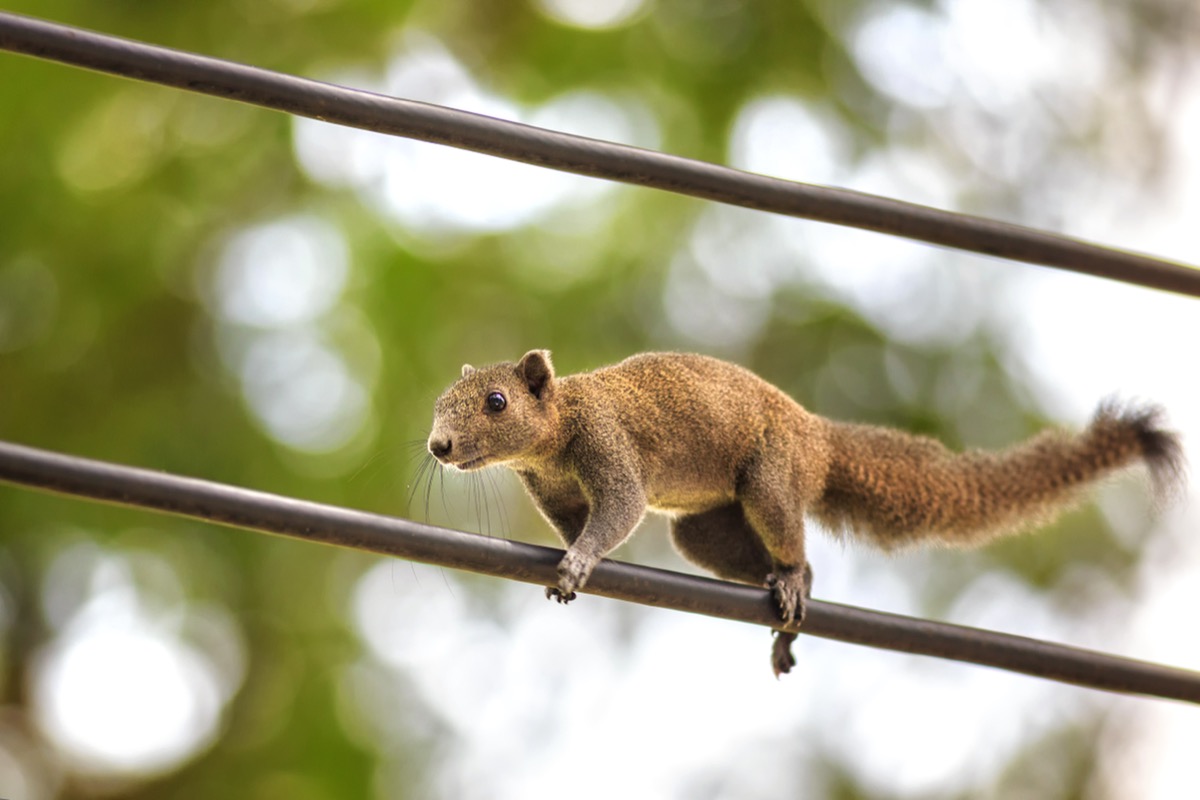
If you think squirrels are packed with energy, wait until you’ve seen them during an eclipse. If you can believe it, squirrels become more active and run around even more than usual. They basically engage in all their daily activities at a hyperspeed, per a 1973 article in the journal Bolletino di zoologia.
23
Deer are puzzled by the faux dusk.
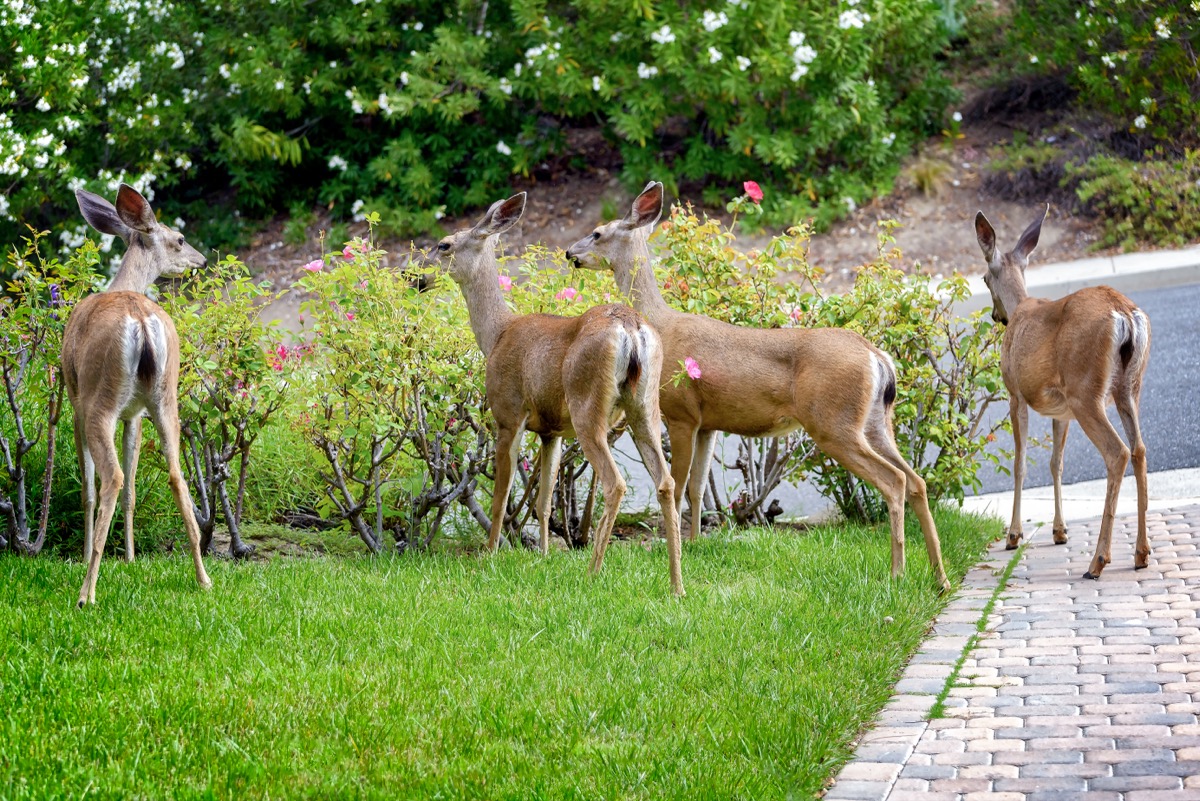
Like most animals, deer confuse the totality of the eclipse for dusk. Since they’re crepuscular creatures, deer are mainly active at dawn and toward the end of the day.
Biologist Nicole Baker of The Wild Center explained that because of this, deer are prone to become more active during this solar event, despite being dormant before it.
24
Ants take some time off and clock out of work.
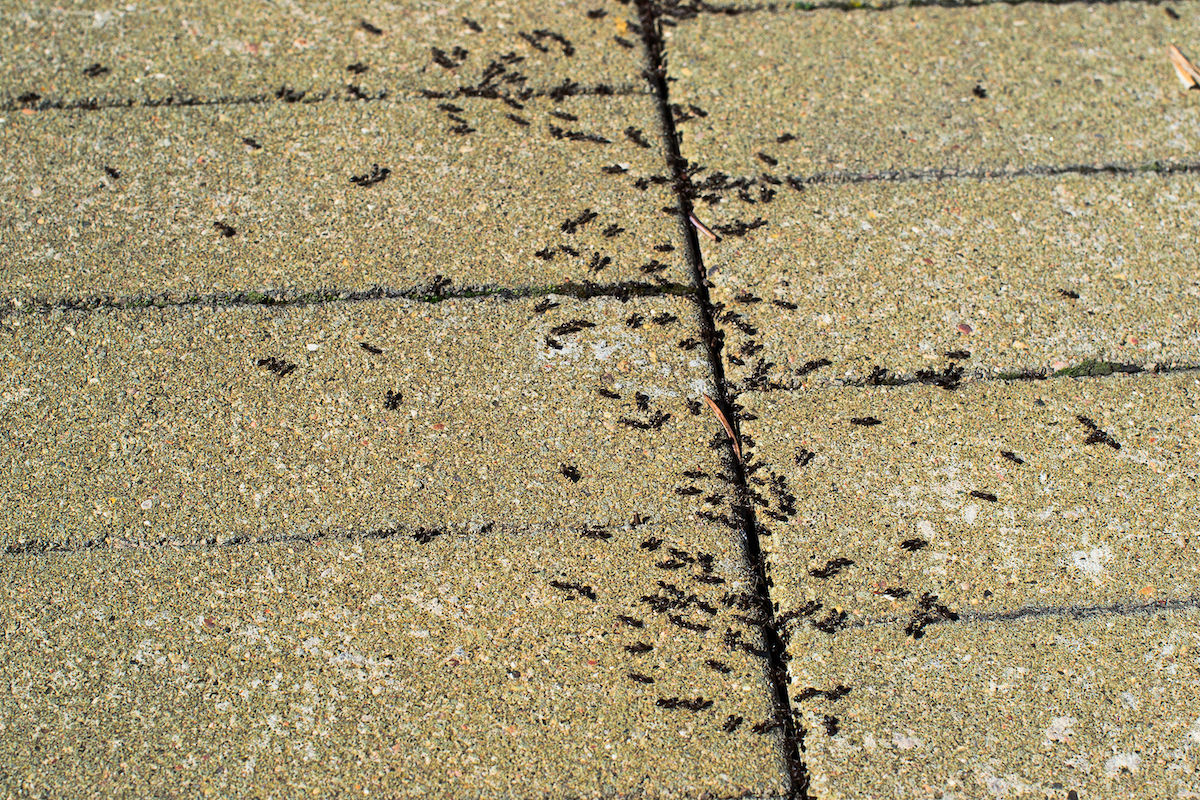
Ants are some of the hardest-working bugs on the planet, but during an eclipse, they pause, per a 1937 study published in Proceedings of the American Academy of Arts and Sciences.
Like many animals, ants also settle into their sleeping positions because they mistake the darkness for dusk.
25
Crickets respond with a symphony of chirps.
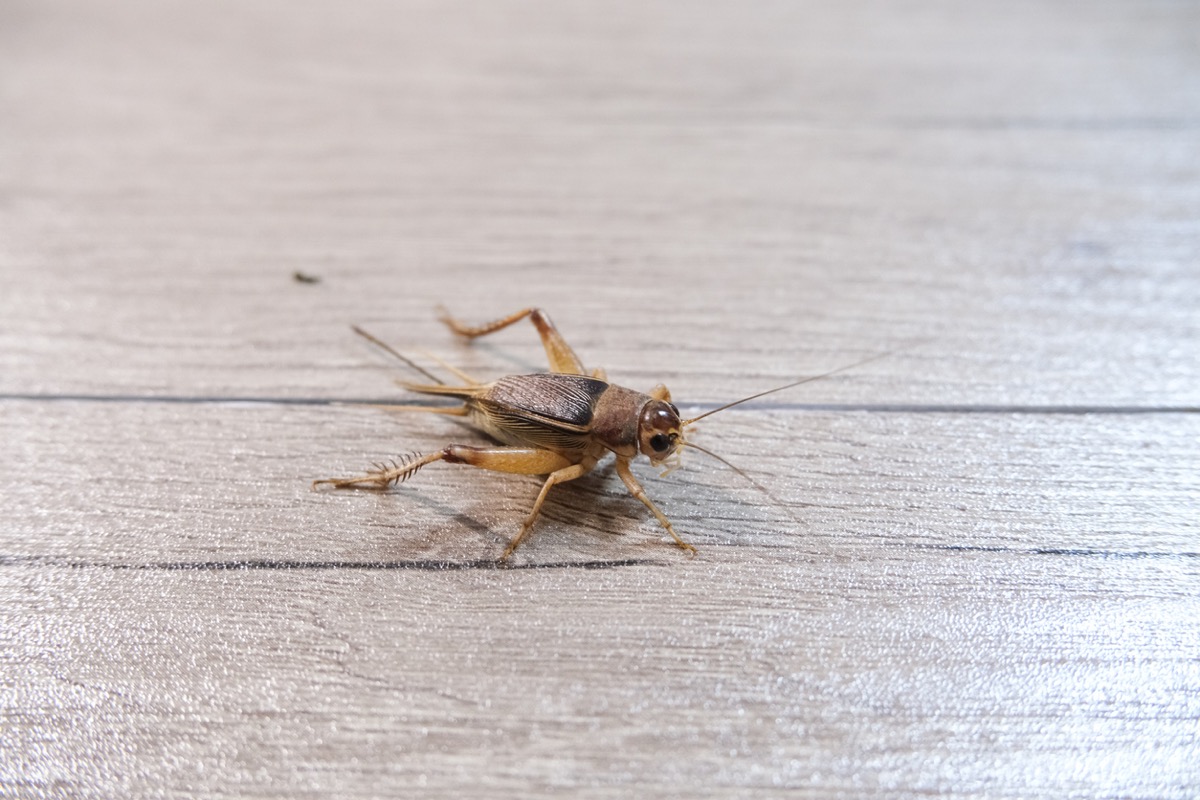
If you’re fond of the sound of crickets chirping, the total solar eclipse is the perfect time to listen. Crickets usually sing their songs at dusk to attract a mate, so when an eclipse occurs, they think it’s nighttime and begin their soft chitters.
26
Cicadas stop their humming.
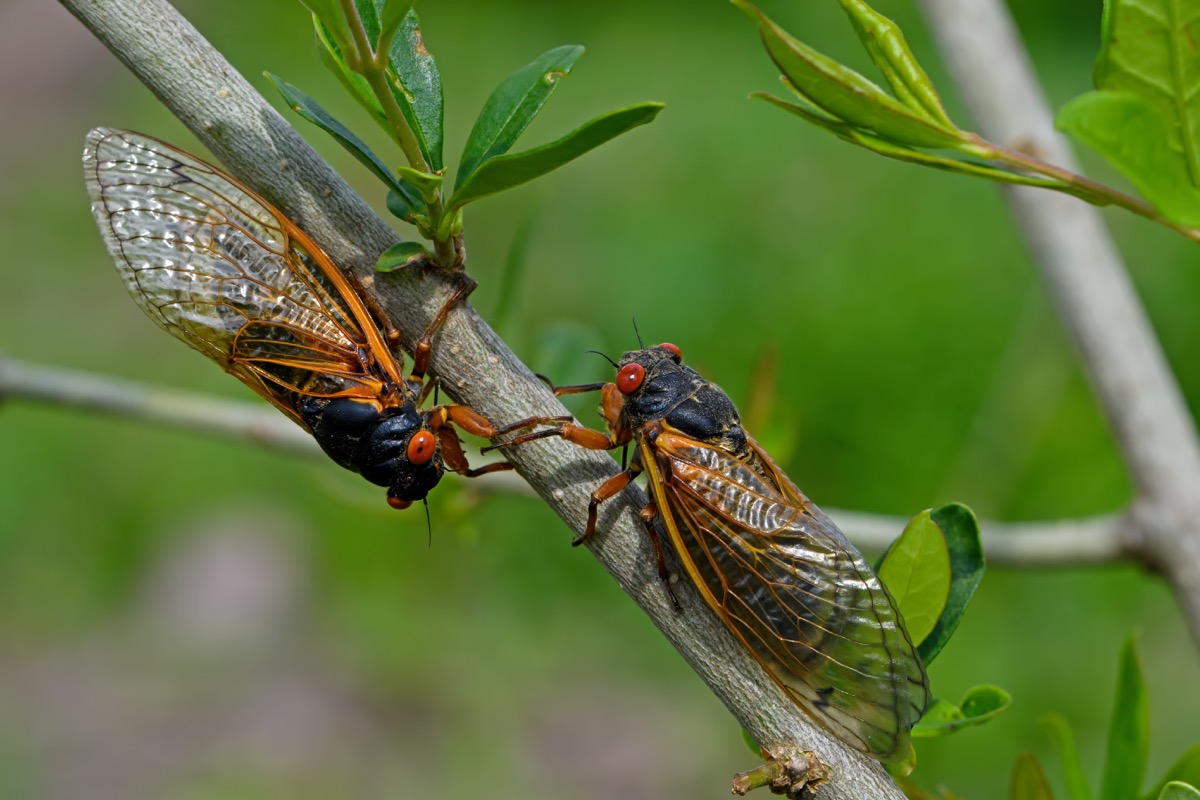
Cicadas are known for filling the warmer months with a buzzing drone, and this year is bringing double broods. But during a solar eclipse, these noisy insects go silent.
In a 1992 article published in The Florida Entomologist, researchers explained, “The decrease in radiative heat gain during the eclipse appears to be responsible for the inhibition of calling in the cicadas. Without the normal degree of radiant energy present in their environment, the cicadas may not have been able to maintain the elevated body temperature that is necessary for activity.”
27
Bats take advantage of the darkness.
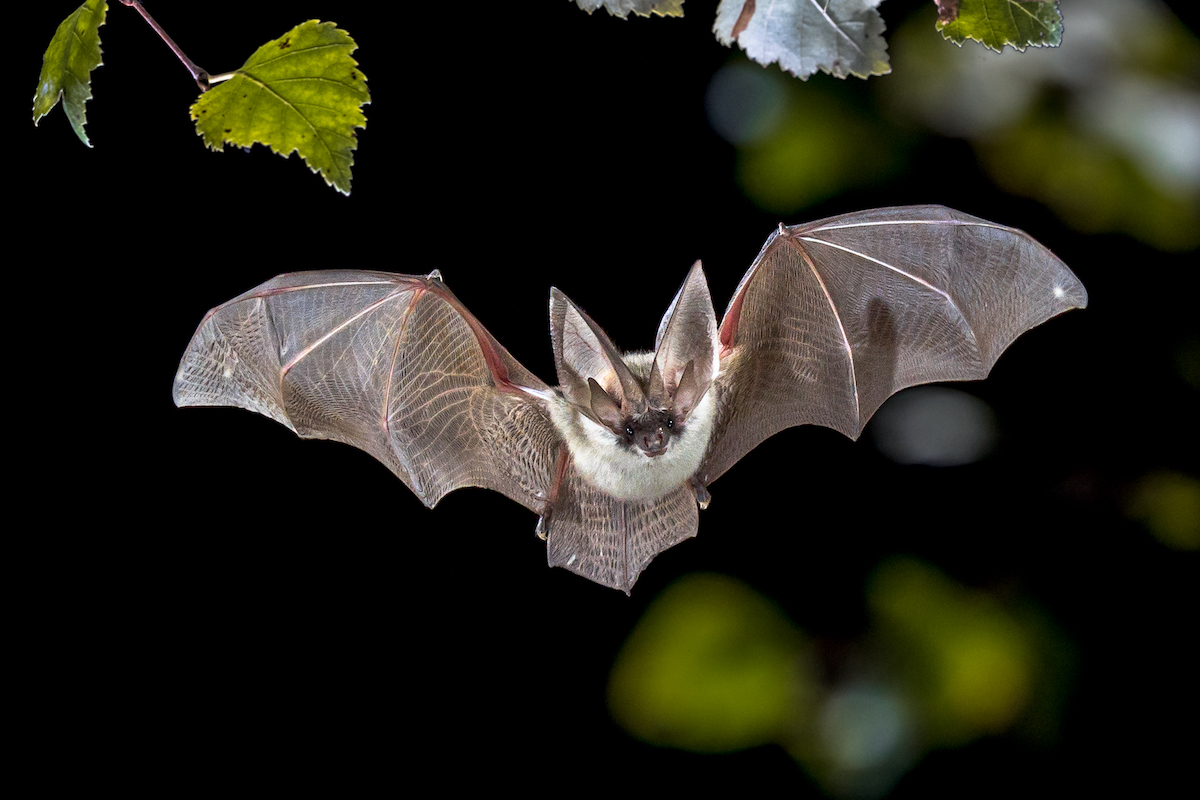
When bats aren’t eating mosquitoes or using echolocation to navigate the world around them, these nocturnal creatures spend the day sleeping. But during an eclipse, the darkness tricks them into thinking it’s nighttime, which is why they wake up.
According to Observations of Bats during a Total Solar Eclipse in Mexico, published in The Southwestern Naturalist in 1999, a researcher observed bats flying from their caves and engaging in daily nocturnal activities during a total solar eclipse.
28
Elephants get ready for bed.
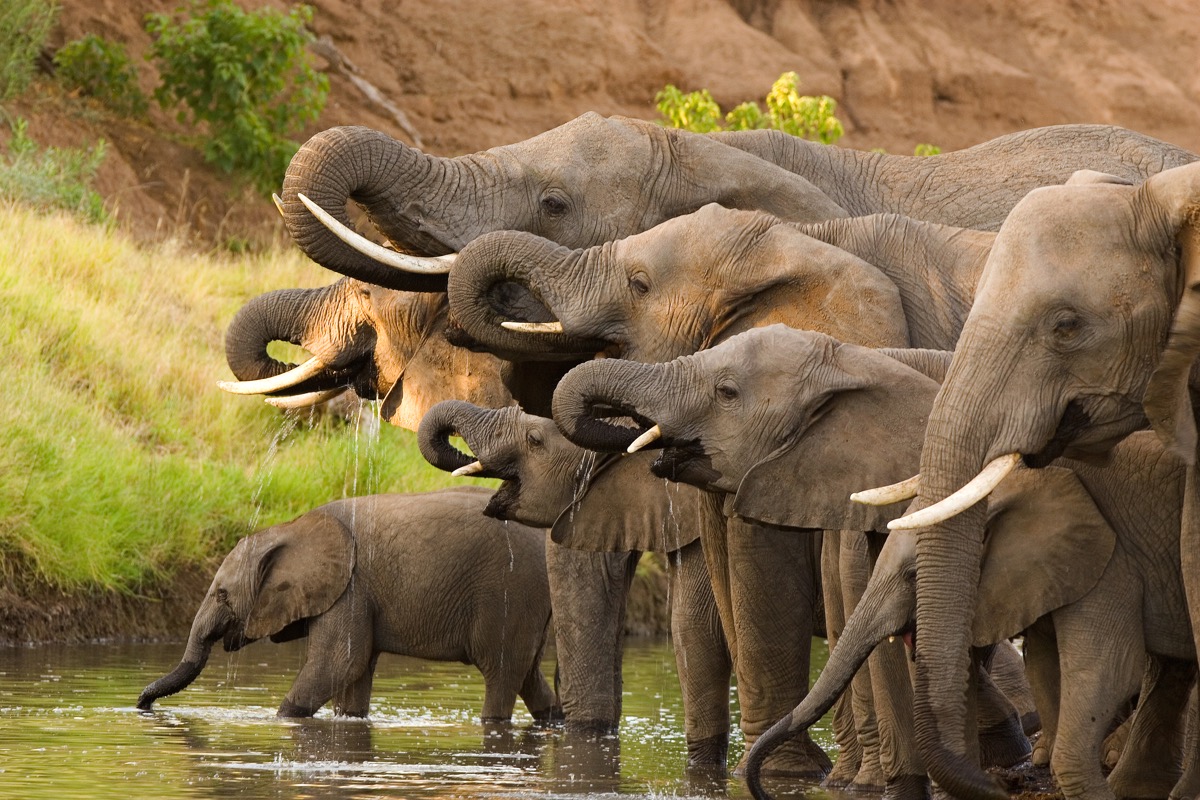
Elephants may have the largest brains of any land animal, but they are also fooled by the darkness caused by the eclipse. According to the Hartstone-Rose-led study, elephants moved toward their sleep areas in preparation for their nighttime routines.
29
Giraffes work through their eclipse anxiety.
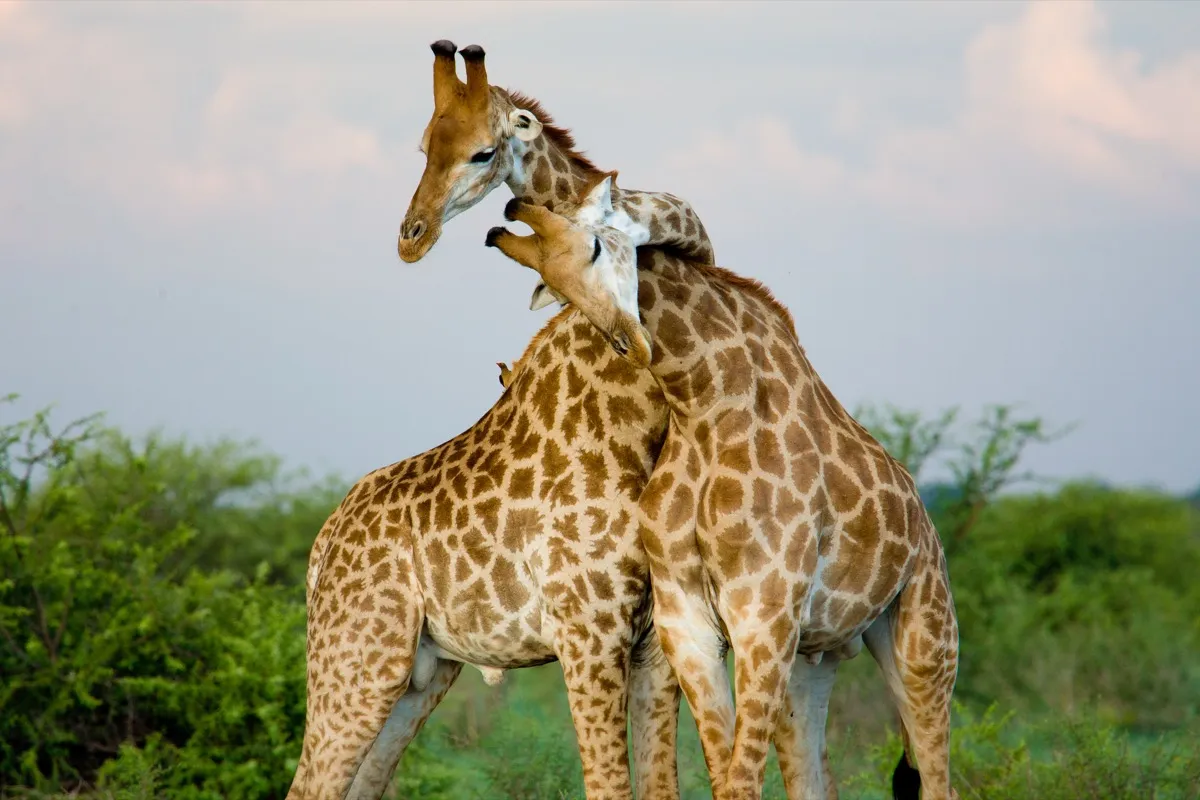
Giraffes tend to feel uneasy about solar eclipses and show signs of anxiety. Like tortoises, giraffes are known to huddle together during the event. Per the study led by Hartstone-Rose, they have also been reported to run around and swing their necks and bodies frantically.
Overall, Giraffes are much more active than their baseline behavior, which scientists believe is evidence of stress.
30
Hippos stop their riverside rest.
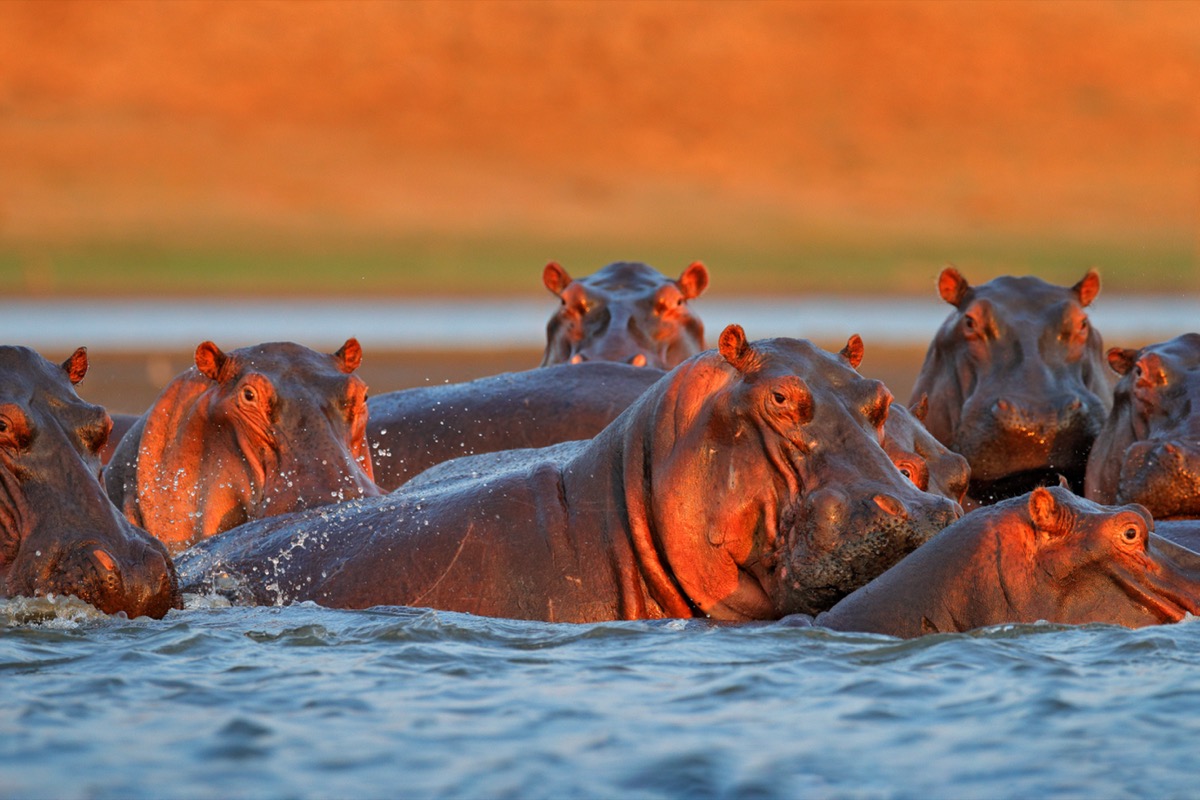
Hippos usually spend their time sleeping under the Sun in the river. But when an eclipse occurs, they rouse from their slumber and move toward the river’s bank.
“The diminishing light and warmth evidently reminded the hippos of sunset, when they normally disperse off the mid-stream sandbank and walk to the riverbanks along the bottom of the river (they are too heavy to swim),” astronomer Paul Murdin wrote in Astronomy and Geophysics (via Mongabay).
31
Whales host a watch party.

Fun fact: Whales are just as interested in watching the eclipse as humans. Per Time, Douglas Duncan, the director of the Fiske Planetarium at the University of Colorado, observed strange behavior from whales and dolphins during a 1998 total solar eclipse.
While in the Galapagos Islands, he watched about 20 mammals silently swim in and out of the waters. The whales “surfaced, arching in and out of the water in complete silence.”
32
Grizzly bears wake up.
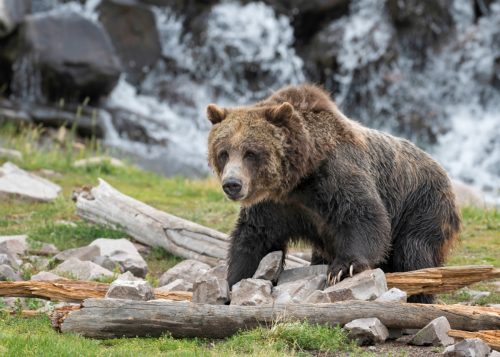
Not much wakes a sleeping grizzly… but a solar eclipse might do it. Reports cited in the Animals study have shown that during totality, these bears have been known to awaken and roam about. As soon as it’s over, however, they find another shady spot to fall asleep in.
33
Gorillas go ape and become agitated.
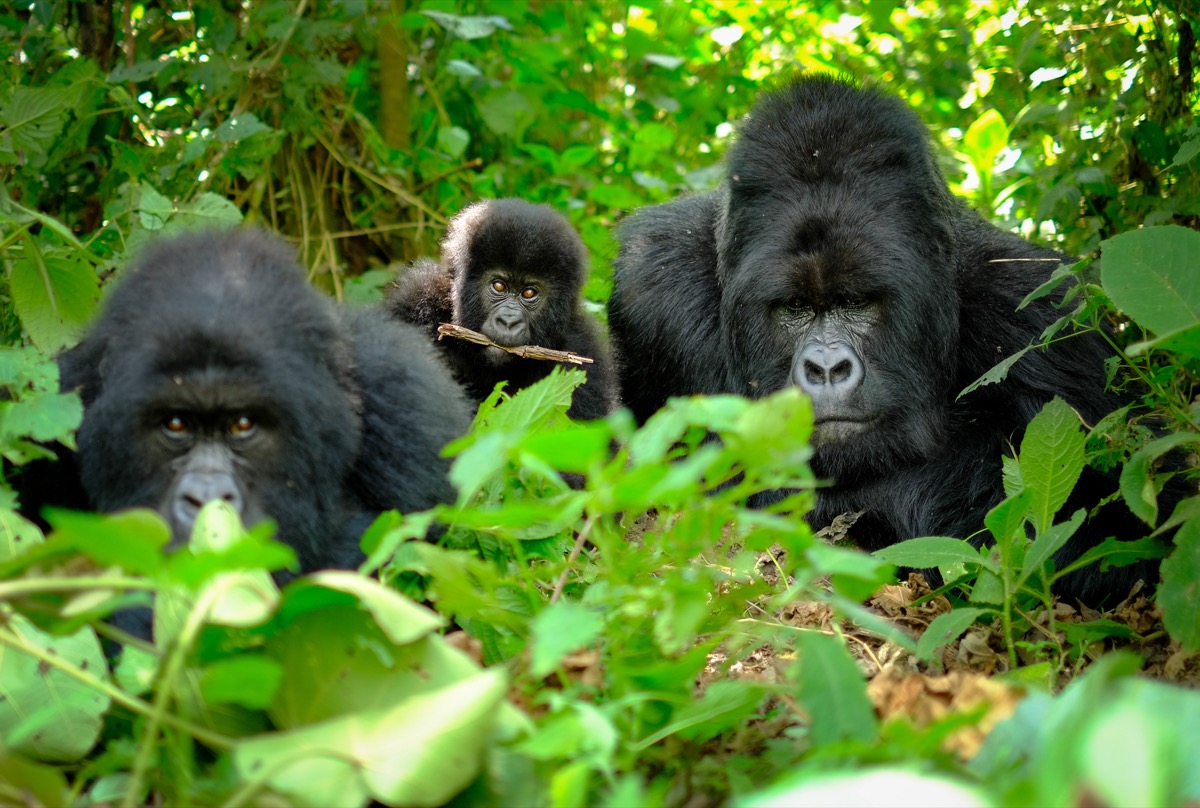
In his 2020 study, Hartstone-Rose observed that gorillas exhibited high levels of anxiety during the event. Some charged toward the glass, while others moved around aggressively at the eclipse’s peak.
The report also stated that female gorillas engaged in behavior that they otherwise only exhibit in the evenings just before heading to bed, which was attributed to the darkness caused by the event. After the eclipse, the gorillas resumed their daytime activities of social grooming and foraging.
34
Siamang gibbons scream and swing around to express their discomfort.
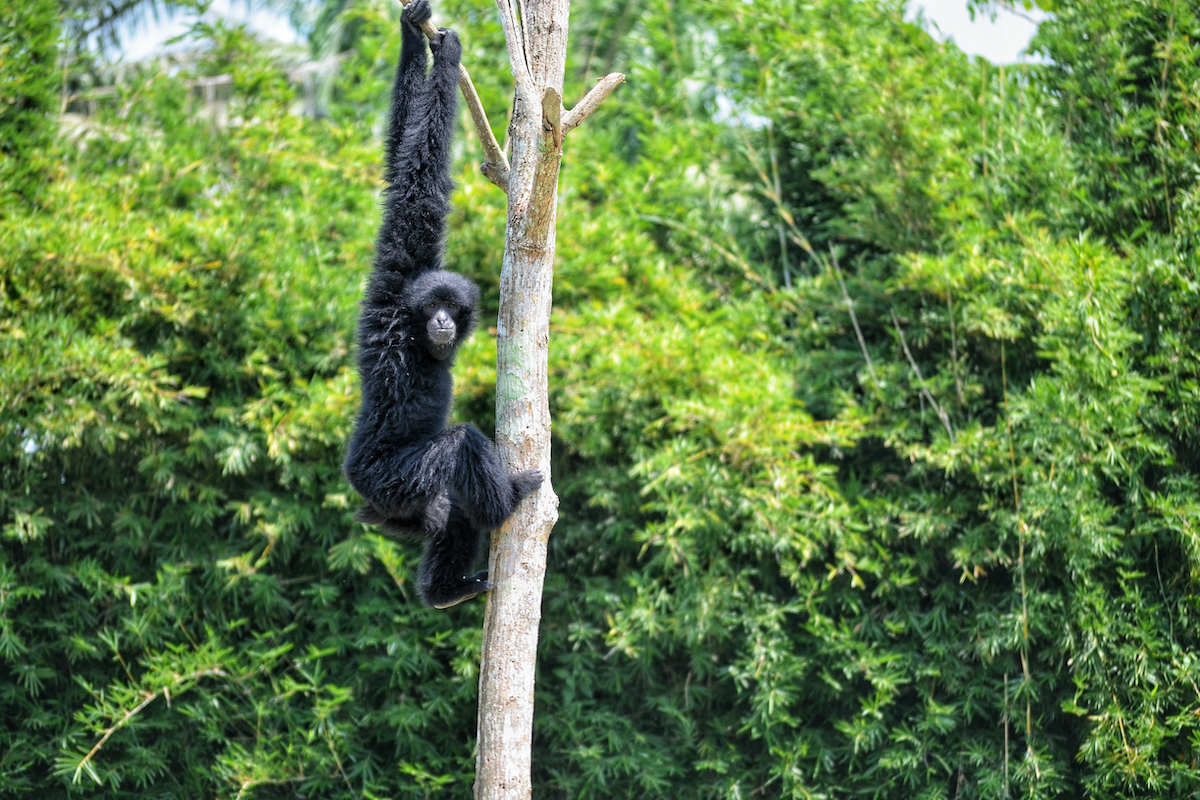
Siamang gibbons are a unique ape species native to the Malay Peninsula in Southeast Asia. They are best known for their pinkish throat sac and distinct calls.
When the eclipse reaches complete darkness, also known as totality, the apes produce loud noises and aggressively swing from one branch to another, according to the Animals study. Researchers noticed that compared to their usual screams, the calls the siamang gibbons make during the event are inconsistent and lack sequence.
35
Orangutans “verbalize” their concerns.
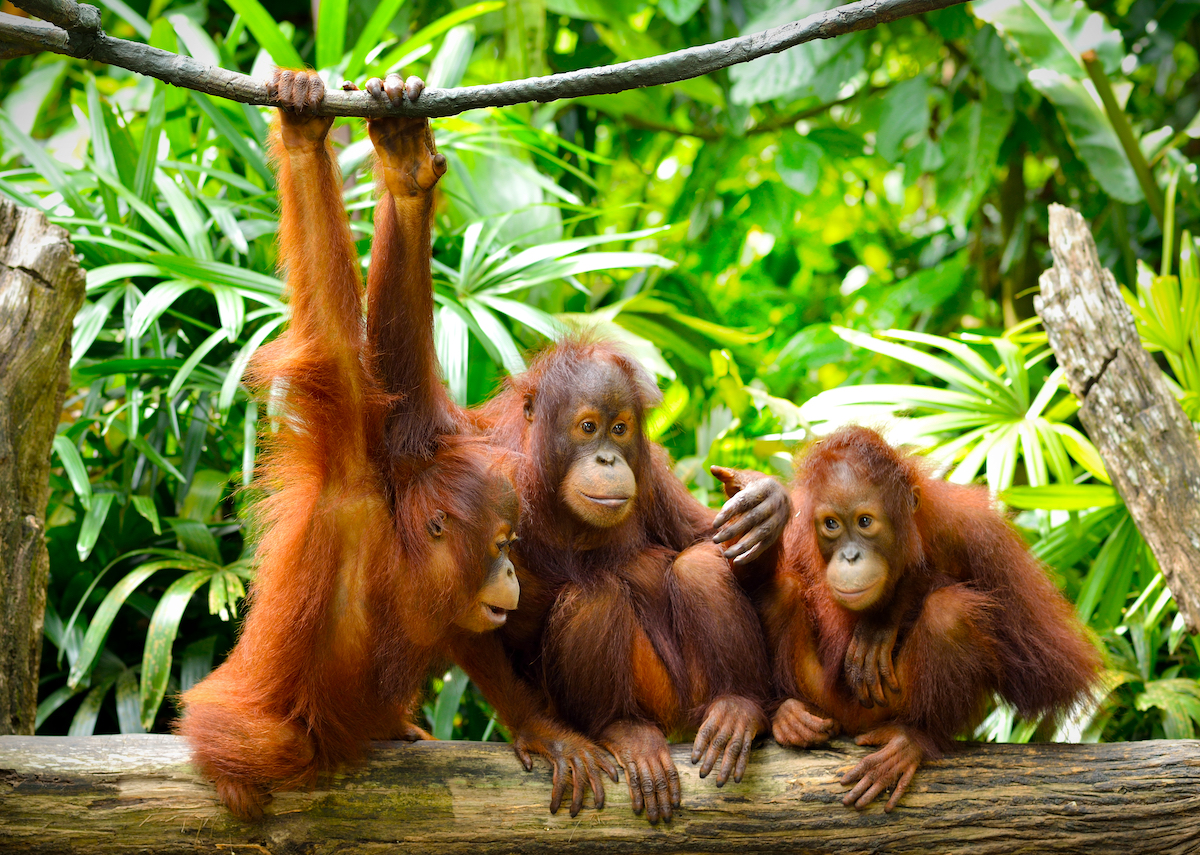
An orangutan’s time is often spent building tree-top nests and snacking on exotic fruits like lychees and figs. But when they face a total solar eclipse, orangutans have been reported to show signs of uneasiness, according to a 2021 study in the Journal of Tropical Biodiversity.
These apes exhibited their discomfort by banging on objects and making short and abrupt low-resonant sounds mixed with high-squeak noises. And when the eclipse reached totality, the orangutans became silent.
RELATED: Here’s How Much of the Total Solar Eclipse You Can See in Your Region.
36
Baboons can go from active caution to muted concern.
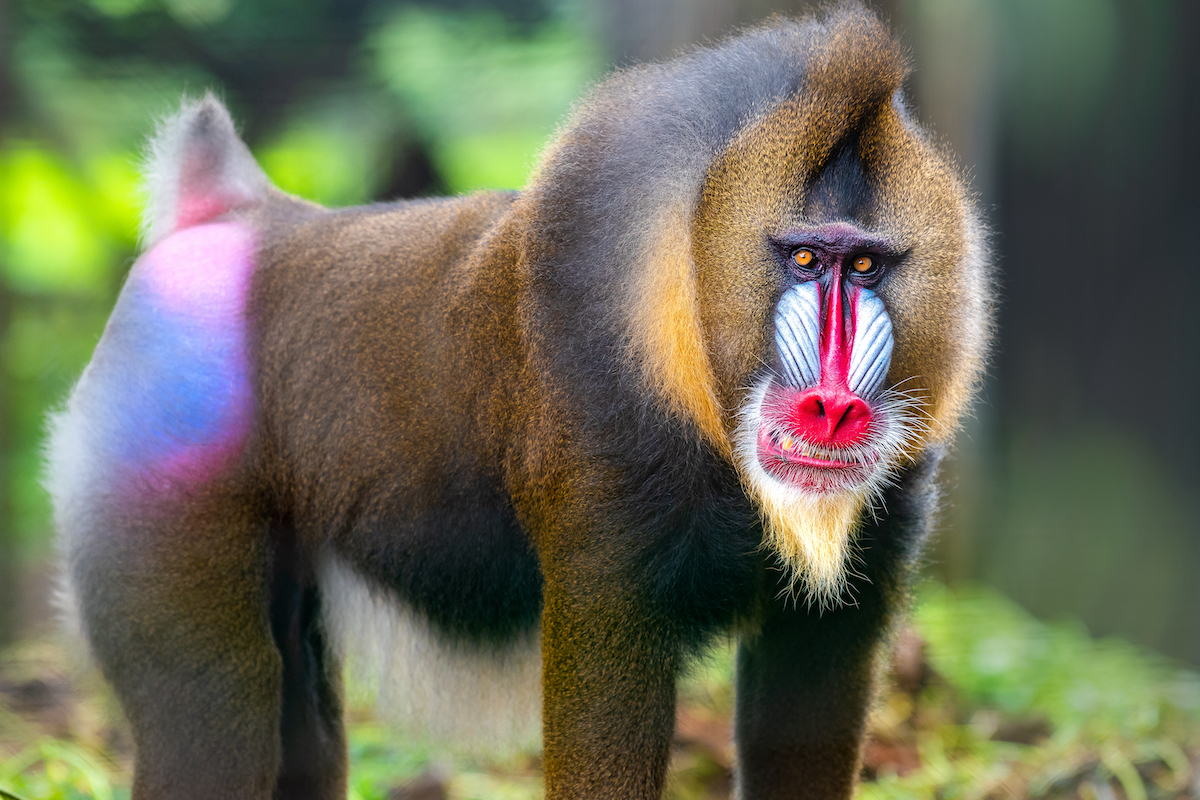
When a baboon’s day isn’t interrupted by a total solar eclipse, they can usually be found resting in the shade or grooming each other. Per the Animals study, research shows that baboons become very vigilant and focus more on their surroundings during an eclipse.
They’re also known to move around their environment quickly or walk around in circles. However, during totality, baboons have been reported to minimize movement and make abrupt sounds.
37
Chimpanzees are eager to take a look.
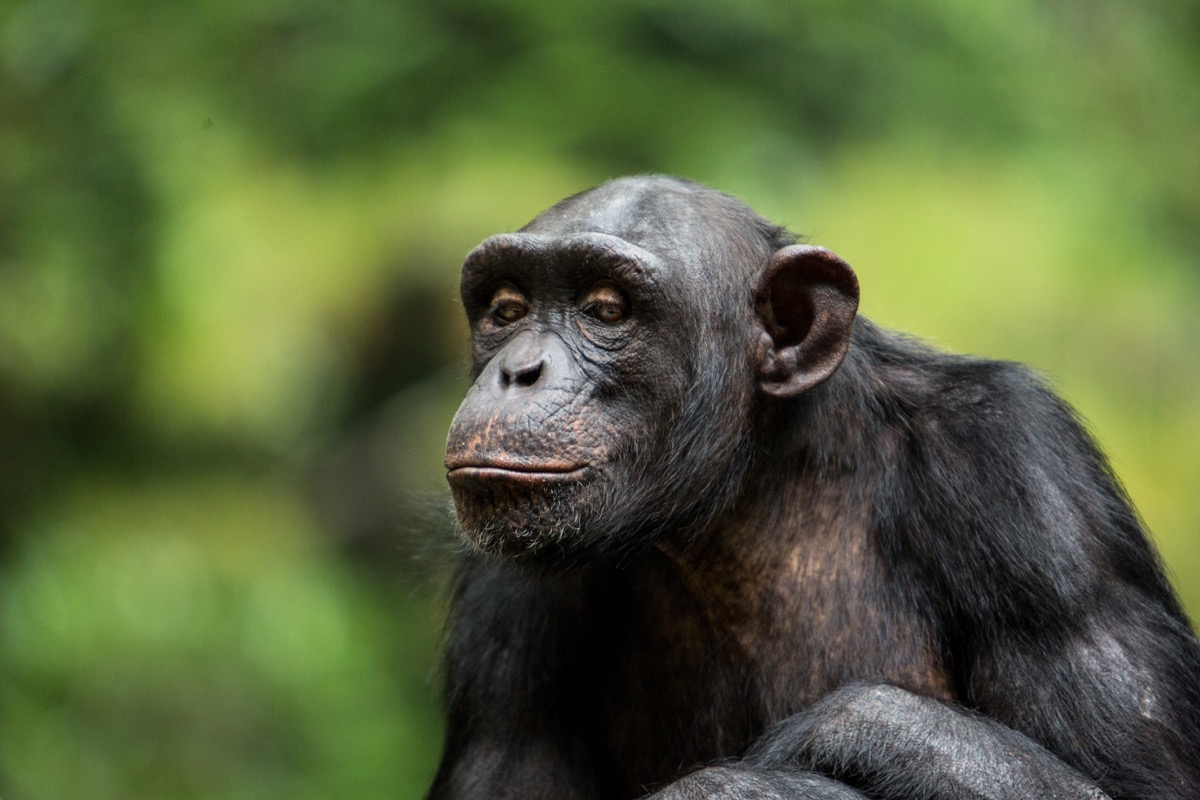
Like many of their primate cousins, chimpanzees react to a solar eclipse with great interest. Curious is the best way to describe their behavior, as chimpanzees have been reported to look toward the sky, even climbing trees to get a better look.
In a 1986 study published in the American Journal of Primatology, a researcher noted, “One juvenile stood upright and gestured in the direction of the sun and moon.”
38
Owl monkeys take a beat and exercise caution.
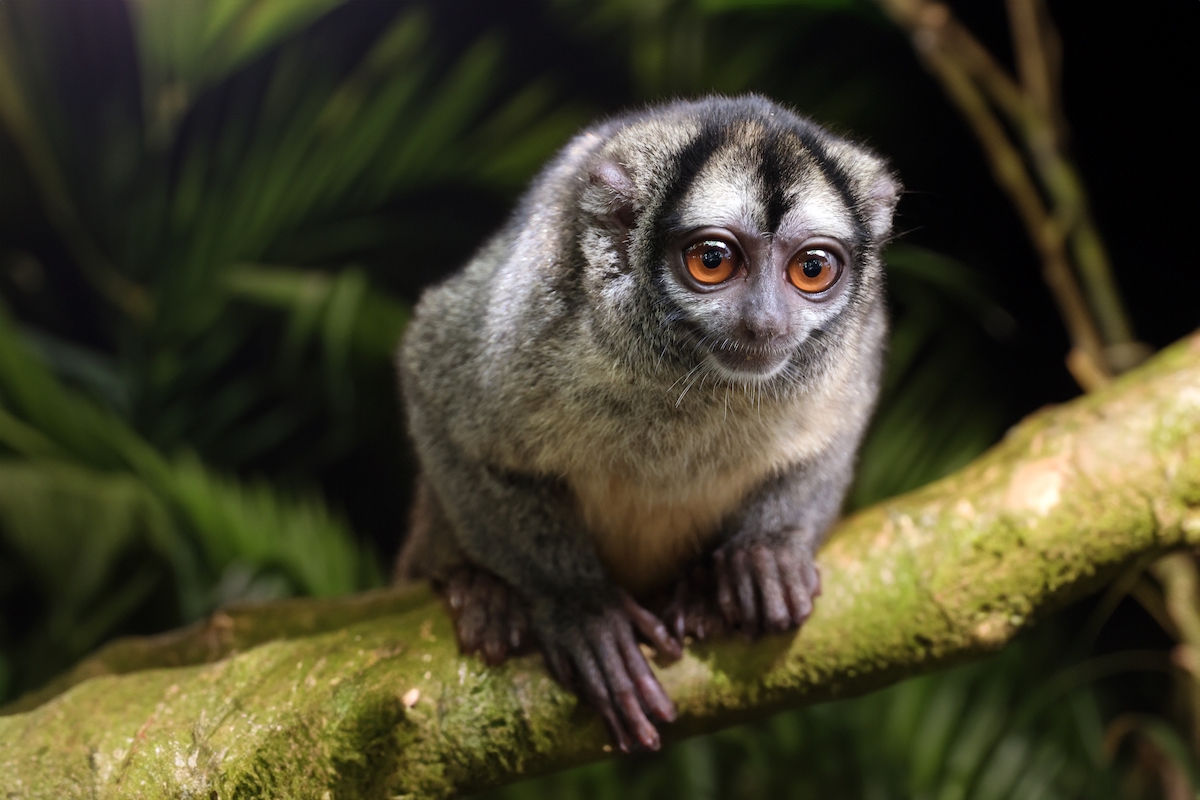
Owl monkeys are a nocturnal species that freeze up during an eclipse. According to a 2010 study in PLOS One, these primates will stop moving about and looking for food when it gets dark.
Researchers believe they do this because owl monkeys have a hard time seeing what they’re foraging for, and want to avoid falling out of the trees.
39
Red ruffed lemurs get ruffled up.
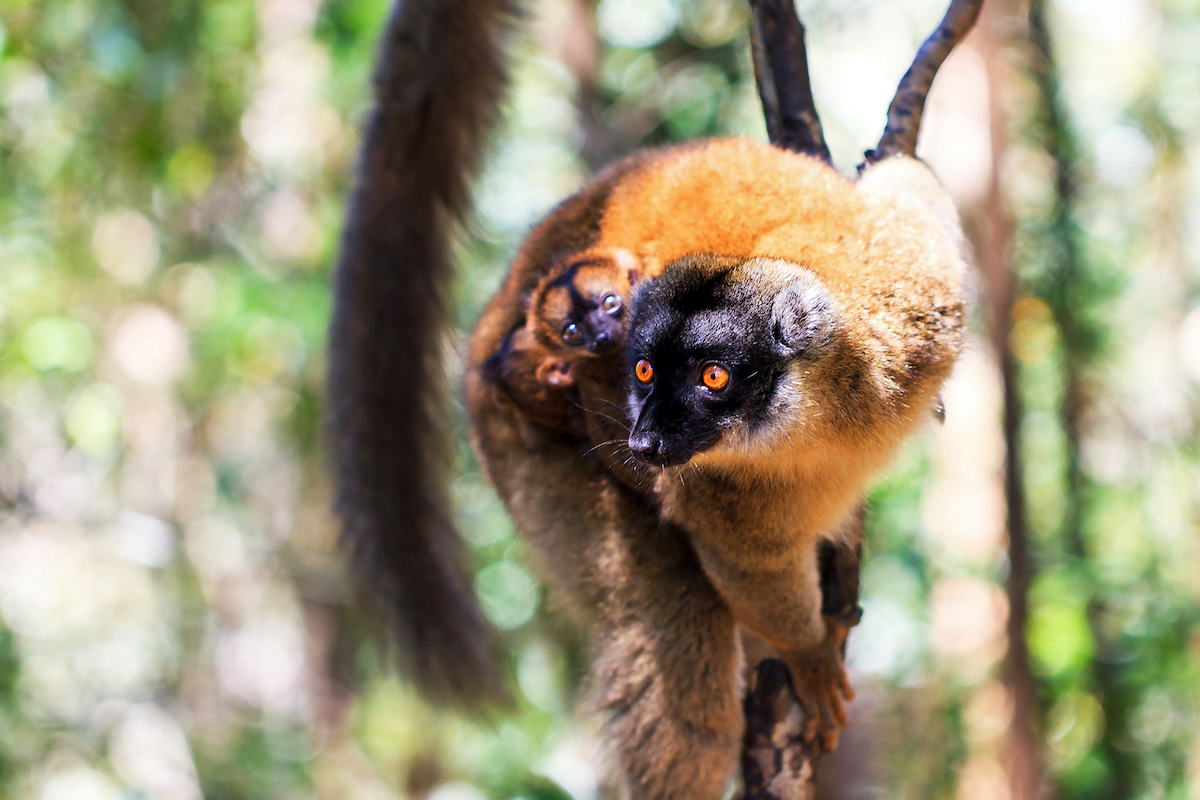
In 2017, the Nashville Zoo put together an article of post-eclipse observations titled “How our Animals Reacted to the Solar Eclipse.”
The zoo wrote that the red ruffed lemurs who were resting before the eclipse became more active: “They all perked up and seemed a little confused as to why they were out on exhibit in the dark. But then didn’t seem to be affected once there was light again.”
40
Galapagos tortoises get a little frisky.
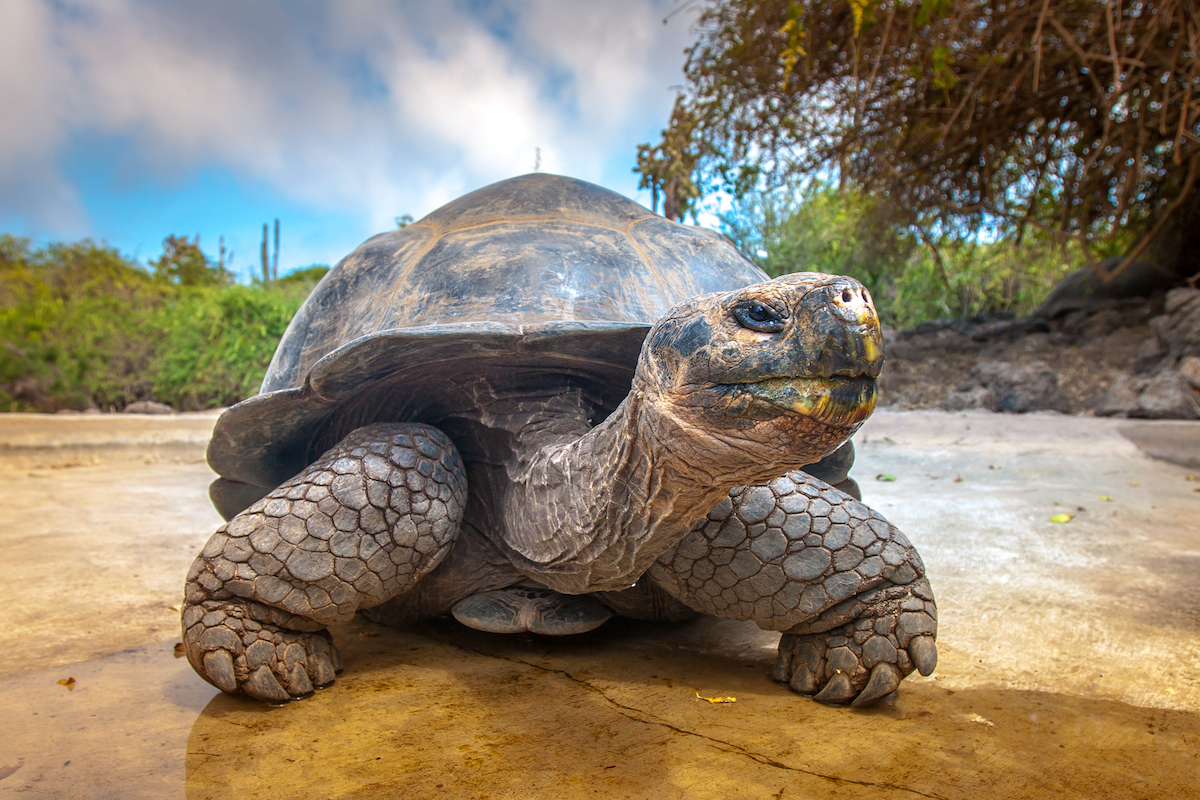
It’s safe to say that the long-lived Galapagos tortoise has more than one solar eclipse under its belt. But decades of experience doesn’t stop these reptiles from reacting to the event.
Researchers from the Animals study observed these gentle giants gathering together, while some even began to mate. The tortoises became more active, exploring their surroundings at a noticeable speed. When the Moon completely blocked the Sun, the animals looked up toward the sky, and as the event ended, the energy of the tortoises decreased.
41
Turtles seek dry land.
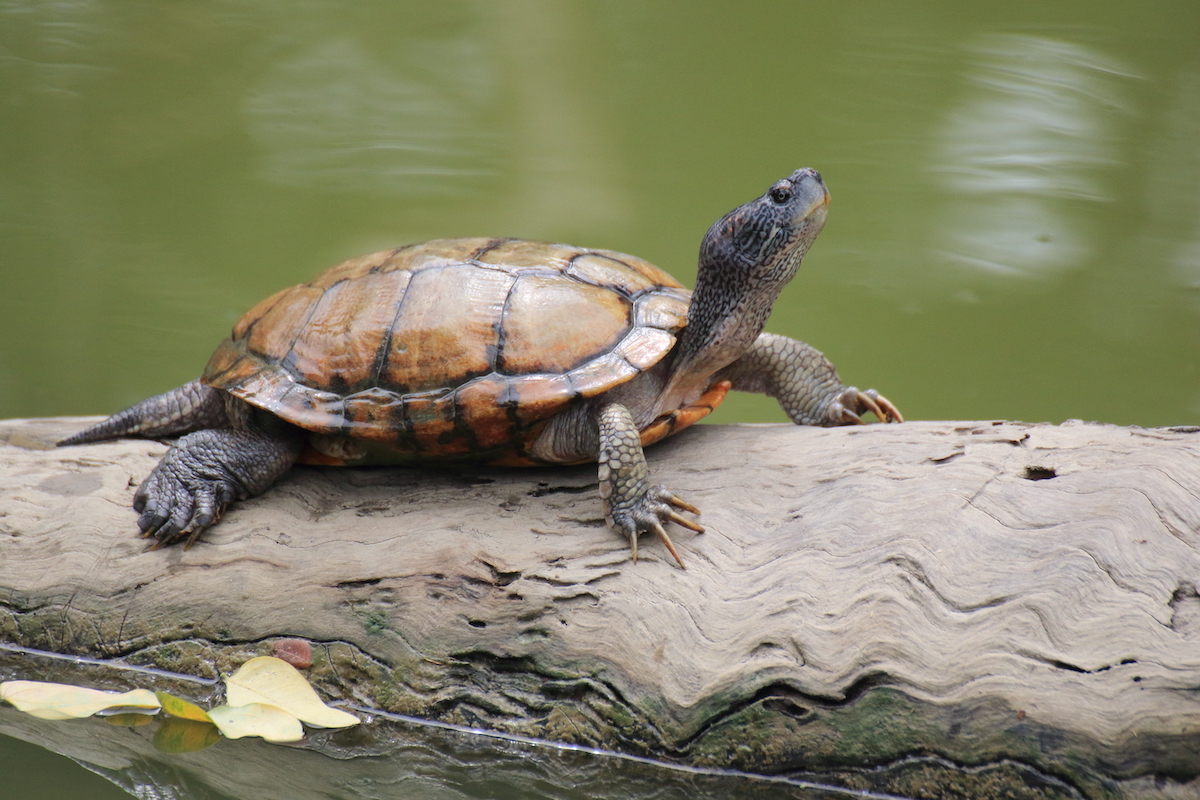
Contrary to typical turtle behavior, these reptiles become pretty active during cosmic events.
According to a 2018 study in The Inspire Journal, many turtles climbed out of the water and sat on the pond’s bank. After it was over, they reentered the water and resumed normal activities, like scoping for food and nesting.
42
Little penguins’ light sensitivity is triggered by the eclipse.
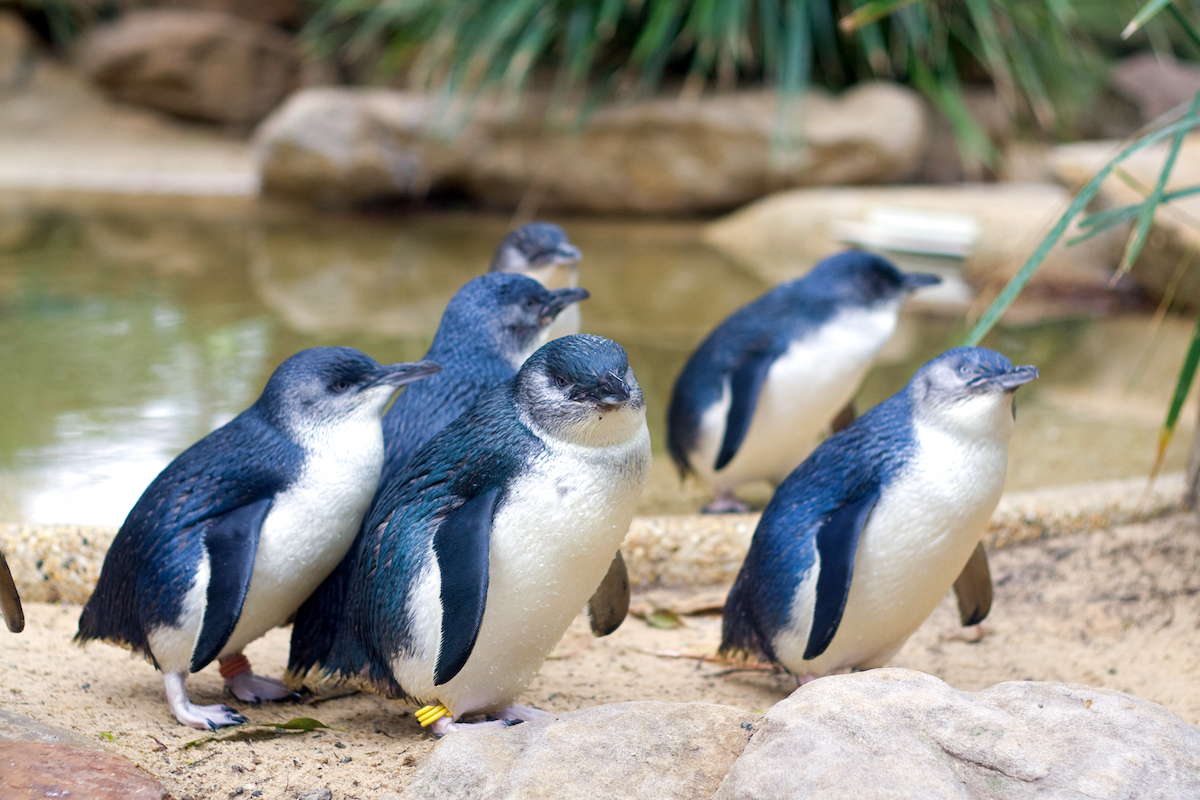
Andre Chiariadia, PhD, explained to Oceana that little penguins are light sensitive and are solely nocturnal when on land, so it’s likely that they are affected by the sudden darkness of the total solar eclipse.
At the same time, Chiariadia clarified that an eclipse would only impact little penguin behavior if it occurred “at sunset when they come home or at sunrise when they leave the colony.”
RELATED: What Really Happens to Your Eyes If You Look Directly at a Solar Eclipse.
43
Tawny frogmouths act very out of character.
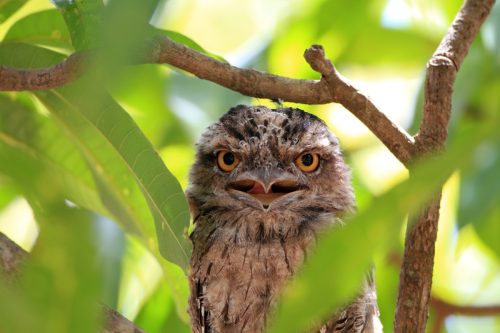
If you’ve never heard of this unusual-looking animal, you’re not alone. Contrary to its misleading name, a tawny frogmouth is a bird with a stocky build and large head. Due to its color and nocturnal habits, people often confuse it with an owl.
When the tawny frogmouth experiences the eclipse’s totality, it becomes vigilant and super active, per the Animals study. It also opens its eyes completely and moves along branches, which is considered uncommon and rare behavior.
44
Zooplankton rush to the ocean’s surface.
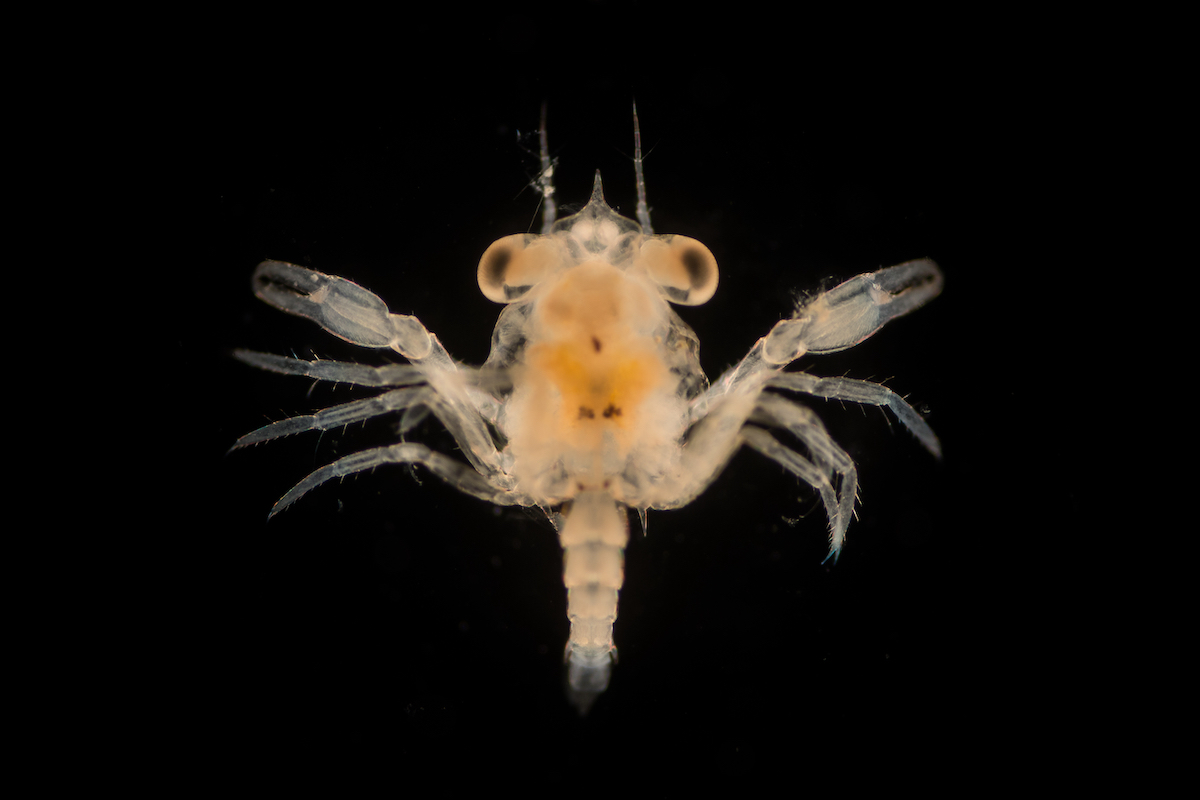
Zooplankton look just as funny as they sound. These tiny translucent microorganisms rely on water currents to move around, but during an eclipse, they climb to the ocean’s surface almost as if called, sometimes from a depth of more than 200 feet.
RELATED: 125 Facts That Will Make You Feel Instantly Smarter.
45
Humans have an existential crisis.

OK, not all humans. Many of us just enjoy watching the show! But throughout history, cultures have had pretty extreme reactions to solar eclipses, with many considering these special celestial occurrences to be bad omens.
As the Exploratorium notes, mankind having a strong emotional reaction to the eclipse is a well-documented phenomenon of its own. You might feel scared, sad, or otherwise moved, and that’s entirely normal. Just feel what comes naturally to you—and make sure not to stare directly at it except for the brief period of totality, no matter how tempting that may be.
Who is unfazed? Apparently, bears.
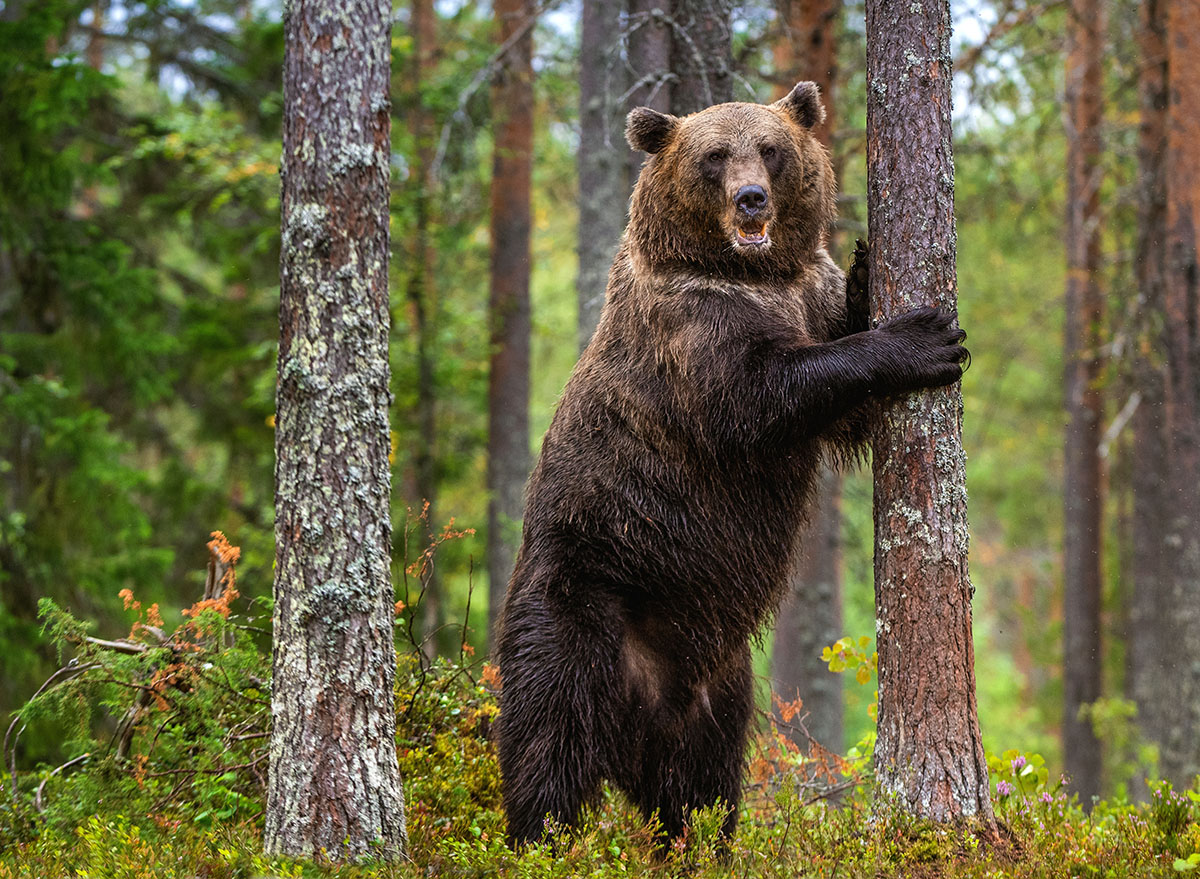
Leave it to our hibernating (non-Grizzly bear) friends to remain totally chill during a total solar eclipse. According to the New York Post, observers at the Riverbanks Zoo & Garden in Columbia, SC, during the 2017 eclipse noticed that the bears didn’t have a reaction. Zoo visitors will likely be gauging if that remains the same this year.
- Source: Types of Solar Eclipses
- Source: Annals of the Entomological Society of America: Pollination on the Dark Side: Acoustic Monitoring Reveals Impacts of a Total Solar Eclipse on Flight Behavior and Activity Schedule of Foraging Bees
- Source: National Audubon Society: A Total Solar Eclipse Is Coming. How Will Birds and Other Wildlife React?
- Source: Astronomy & Geophysics: Effects of the 2001 total solar eclipse on African wildlife
- Source: Indiana University: Unlocking the mysteries of animal behavior during cosmic events
- Source: Ethology: Behavior of Colonial Orb-weaving Spiders during a Solar Eclipse
- Source: Bolletino di zoologia: Ground Squirrel Behaviour During a Partial Solar Eclipse
- Source: Proceedings of the American Academy of Arts and Sciences: Observations on the Behavior of Animals during the Total Solar Eclipse of August 31, 1932
- Source: NASA: Sense the Solar Eclipse with NASA’s Eclipse Soundscapes Project
- Source: The Florida Entomologist: Observations on the Effect of a Partial Solar Eclipse on Calling in Some Desert Cicadas (Homoptera: Cicadidae)
- Source: The Southwestern Naturalist: Observations of Bats during a Total Solar Eclipse in Mexico
- Source: Animals: Total Eclipse of the Zoo: Animal Behavior during a Total Solar Eclipse
- Source: Journal of Tropical Biodiversity: The Response of Orangutans to a Total Solar Eclipse Event
- Source: American Journal of Primatology: Effect of solar eclipse on the behavior of a captive group of chimpanzees (Pan troglodytes)
- Source: PLOS One: Moonstruck Primates: Owl Monkeys (Aotus) Need Moonlight for Nocturnal Activity in Their Natural Environment
- Source: The Inspire Journal: August 21, 2017: A Solar Eclipse for the United States
- Source: Oceana: How will ocean animals react to the solar eclipse?
- Source: University of Washington: Zooplankton Migration During the Eclipse